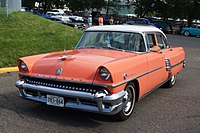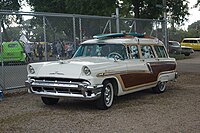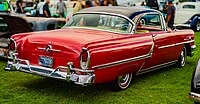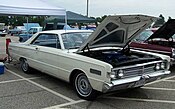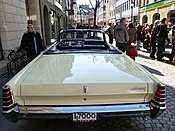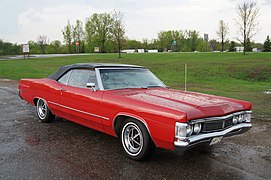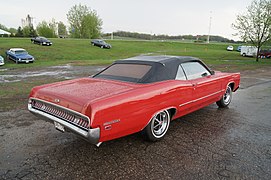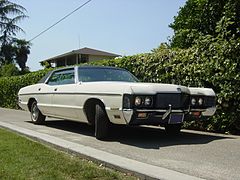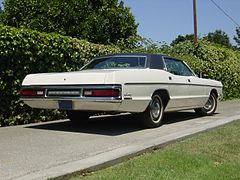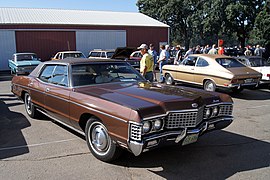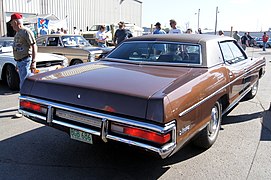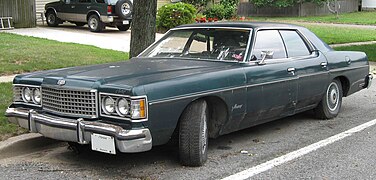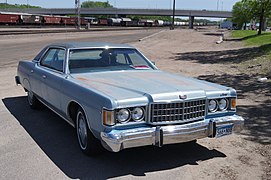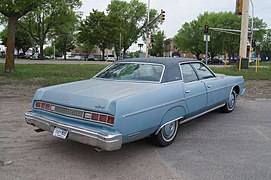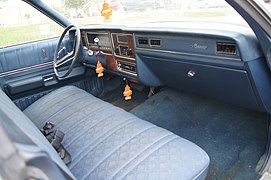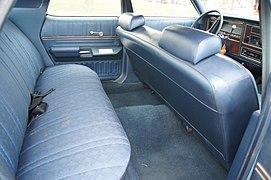Mercury Monterey: Difference between revisions
m robot Adding: de:Mercury Monterey |
m I added categories for bodystyles. |
||
| (364 intermediate revisions by more than 100 users not shown) | |||
| Line 1: | Line 1: | ||
{{Short description|Series of full-size cars produced by Mercury (1952-1974)}} |
|||
''For the Monterey minivan, produced from 2004-2007, see [[Ford Freestar]].'' |
|||
{{Infobox Automobile |
|||
{{Use American English|date=October 2024}} |
|||
| image = [[Image:1971MONTEREYFRONT.JPG|250px|1971 Monterey sedan]] |
|||
{{For|the Monterey minivan produced from 2004 to 2007|Mercury Monterey (minivan)}} |
|||
{{Infobox automobile |
|||
| manufacturer = [[Ford Motor Company]] |
|||
| image = 1972 Mercury Monterey (7818171884) (cropped).jpg |
|||
| production = 1950-1971 |
|||
| caption = 1972 Mercury Monterey 4-door hardtop |
|||
| assembly = [[St. Louis, Missouri]] |
|||
| name = Mercury Monterey |
|||
| layout = [[FR layout]] |
|||
| manufacturer = [[Mercury (automobile)|Mercury]] ([[Ford Motor Company|Ford]]) |
|||
| class = [[Full-size]] |
|||
| production = 1952–1974 |
|||
| body_style = |
|||
| assembly = Main plant<br>[[Wayne, Michigan]]<ref name="Flory, Jr. 2008" /><br>(Branch assembly)<br>[[St. Louis, Missouri]]<br />[[Maywood, California]]<br />[[Pico Rivera, California]]<br />[[Metuchen, New Jersey]] |
|||
| related = [[Ford LTD]] |
|||
| aka = |
|||
| predecessor = [[Mercury Eight]] |
|||
| successor = [[Mercury Marquis]] |
|||
| class = [[Full-size]] |
|||
| body_style = 4-door [[sedan (car)|sedan]]<br /> 2-door sedan <br /> 2-door [[coupe]] |
|||
}} |
}} |
||
{{Infobox Automobile generation |
|||
The '''Mercury Monterey''' is a series of [[full-size car]]s that were manufactured and marketed by the [[Mercury (automobile)|Mercury]] division of [[Ford Motor Company|Ford]] from 1950 to 1974. Deriving its name from [[Monterey Bay]], the initial Mercury Monterey served as the top-of-the-line two-door sedan model for 1950 and 1951 to compete with the hardtop models of Oldsmobile and Buick. It came with a vinyl roof covering, upgraded upholstery, and other features. The hardtop was introduced for 1952. During its production, the Monterey would be offered in multiple body styles, ranging from coupes, convertibles, sedans, hardtops, and station wagons. |
|||
| image = [[Image:RedMercuryMonterey2.jpg|250px|1965 Monterey convertible]] |
|||
| name = Fourth generation |
|||
Over its 22 years of production, the Monterey served variously as the flagship, mid-range, and entry-level offering of the full-size Mercury product range. The only Mercury nameplate to be in continuous production throughout the 1960s,<ref name="hsw7">{{cite web|url=http://auto.howstuffworks.com/mercury-cars7.htm|title=Full-Size Mercury Cars of the 1960s|work=How Mercury Cars Work|date=6 June 2007|publisher=HowStuffWorks.com|access-date=2008-12-03}}</ref> the Monterey was positioned above the [[Mercury Medalist|Medalist]], [[Mercury Custom|Custom]], and [[Mercury Meteor|Meteor]]; later, it was positioned below the [[Mercury Turnpike Cruiser|Turnpike Cruiser]], [[Mercury Montclair|Montclair]], [[Mercury Park Lane|Park Lane]], and finally the [[Mercury Marquis|Marquis]]. |
|||
| production = 1965-1968 |
|||
| body_style = |
|||
Following the 1974 model year, Mercury discontinued the Monterey, consolidating its full-size range down to the Marquis and Colony Park station wagon. For 2004, the Monterey nameplate was revived, becoming the counterpart of the [[Ford Freestar]] minivan; it was produced through the 2007 model year. |
|||
| engine = 390 in³ [[Ford FE engine#390|FE]] V8<br>410 in³ [[Ford FE engine#410|FE]] V8<br>427 in³ [[Ford FE engine#427|FE]] V8<br>428 in³ [[Ford FE engine#428|FE]] V8 |
|||
| transmission = 3-speed [[Cruise-O-Matic]]<br>3-speed [[Ford C6 transmission|C6]] automatic |
|||
{{TOC_left}} |
|||
| wheelbase = |
|||
{{Clear}} |
|||
| length = |
|||
| weight = |
|||
==Early history== |
|||
| related = |
|||
[[File:50 Mercury Monterey (6018283960).jpg|thumb|left|1950 Mercury Monterey]] |
|||
The Monterey (model 72C) was introduced in 1950 as a high-end two-door coupe as part of the [[Mercury Eight]] series in the same vein as the [[Ford Crestliner]], the [[Lincoln EL-series|Lincoln]] [[Lincoln Lido|Lido]] coupe and the [[Lincoln Cosmopolitian|Lincoln Cosmopolitan]] [[Lincoln Capri|Capri]] coupe in order to compete with the [[hardtop]] coupes [[General Motors]] and [[Chrysler]] had introduced the previous model year. Montereys had either a canvas covered convertible for $2,146 (${{formatnum:{{Inflation|US|2146|1950}}}} in {{Inflation-year|US}} dollars {{inflation-fn|US}}) or vinyl for $2,157 (${{formatnum:{{Inflation|US|2157|1950}}}} in {{Inflation-year|US}} dollars {{inflation-fn|US}}). Standard features included leather faced seats, simulated leather headliner, wool carpets, chrome-plated interior garnish moldings, two-toned dashboard, special black steering wheel, fender skirts, dual outside rearview mirrors, full wheelcovers & gold winged hood ornament. For $10 more (${{formatnum:{{Inflation|US|10|1950}}}} in {{Inflation-year|US}} dollars {{inflation-fn|US}}) all leather seats were an option. Two special colors were offered, Turquoise Blue with dark blue top and Cortaro Red metallic with black top. Black with yellow top was also available. Few Montereys were sold. |
|||
{{Clear}} |
|||
==1952–1954== |
|||
{{Infobox automobile |
|||
| image = 1953 Mercury Monterey coupe (7708029692) (cropped).jpg |
|||
| name = First generation |
|||
| model_years = 1952–1954 |
|||
| body_style = 4-door [[sedan (car)|sedan]]<br />2-door [[hardtop]]<br />2-door [[convertible (car)|convertible]]<br />4-door [[station wagon]] |
|||
| engine = {{convert|255|cuin|L|1|abbr=on}} [[Ford Flathead engine#255|Flathead]] [[V8 engine|V8]]<br />{{convert|256|cuin|L|1|abbr=on}} [[Ford Y-block engine#256|Ford Y-block]] [[V8 engine|V8]] |
|||
| transmission = 3-speed [[manual transmission|manual]]<ref name="Flory, Jr. 2008">{{cite book|last=Flory, Jr.|first=J. "Kelly"|title=American Cars, 1946–1959 Every Model Every Year|year=2008|publisher=McFarland & Company, Inc., Publishers|isbn=978-0-7864-3229-5}}</ref><br />3-speed [[Cruise-O-Matic|Merc-O-Matic]] [[automatic transmission|automatic]]<ref>{{cite web|url=http://www.oldcarbrochures.com/enwiki/static/NA/Mercury/1952_Mercury/1952_Mercury_Prestige_Brochure/1952%20Mercury%20Prestige-22-23.html |title=Directory Index: Mercury/1952 Mercury/1952 Mercury Prestige Brochure |publisher=Oldcarbrochures.com |access-date=2011-11-20}}</ref> |
|||
| wheelbase = {{Convert|118.0|in|mm|0|abbr=on}}<ref name="Flory, Jr. 2008"/> |
|||
| length = {{Convert|202.2|in|mm|0|abbr=on}} (1952) |
|||
| width = {{Convert|73.5|in|mm|0|abbr=on}}<ref>{{Cite web|url=http://oldcarbrochures.org/United%20States/Mercury/1953-Mercury/1953-Mercury-Foldout/slides/1953_Mercury_Foldout-02.html|title=1953 Mercury Foldout|work=The Old Car Manual Project Brochure Collection}}</ref> |
|||
| related = [[Lincoln Cosmopolitan#Second generation (1952-1954)|Lincoln Cosmopolitian]]<br>[[Lincoln Capri]]<br />[[Mercury Custom]]<br />[[Ford Crestline Skyliner]] |
|||
}} |
}} |
||
{{Infobox Automobile generation |
|||
As Ford began to position Mercury as a mid-priced competitor to the [[Pontiac Chieftain]], [[Buick Special]], [[Studebaker Commander]], [[Hudson Pacemaker]], [[Kaiser-Frazer|Kaiser Virginian]], [[Nash Statesman]], [[Dodge Meadowbrook]] and [[Dodge Coronet]], all Mercury vehicles received a styling and engineering redesign for 1952, such as 18% more window area.<ref name="Flory, Jr. 2008"/><ref>{{cite web|url=http://www.oldcarbrochures.com/enwiki/static/NA/Mercury/1952_Mercury/1952_Mercury_Prestige_Brochure/1952%20Mercury%20Prestige-04-05.html |title=Directory Index: Mercury/1952 Mercury/1952 Mercury Prestige Brochure |publisher=Oldcarbrochures.com |access-date=2013-03-01}}</ref> Monterey became a separate series and Mercury's top model line over the mainstream [[Mercury Custom|Custom]] nameplate, a convertible and four-door sedan were included in the new series lineup. The heater and vent controls were changed to levers and placed on a plane set perpendicular to the dash behind the steering wheel, inspired by flight controls in large aircraft.<ref>{{cite web|url=http://www.oldcarbrochures.com/enwiki/static/NA/Mercury/1952_Mercury/1952_Mercury_Prestige_Brochure/1952%20Mercury%20Prestige-04-05.html |title=Directory Index: Mercury/1952 Mercury/1952 Mercury Prestige Brochure |publisher=Oldcarbrochures.com |access-date=2011-11-20}}</ref> The listed retail price was US$2,370 for the convertible (${{formatnum:{{Inflation|US|2370|1952}}}} in {{Inflation-year|US}} dollars {{inflation-fn|US}}).<ref name="Flory, Jr. 2008"/> Eleven exterior colors were offered and seventeen two-tone color combinations were provided, and the standard list of equipment included broadcloth upholstery, full carpeting, and electric clock, luggage compartment light and chrome window surroundings. Optional equipment included a heater and windshield defroster, radio with antenna, and fog lamps.<ref name="Flory, Jr. 2008"/> |
|||
| image = [[Image:71MONTEREYREAR.JPG|250px|1971 Monterey sedan]] |
|||
| name = Fifth generation |
|||
A station wagon was first introduced as a Mercury for 1953 including an optional "[[Woodie (car body style)|woodie]]" appearance, the same year a Siren Red Monterey Convertible became Ford's forty-millionth car produced.<ref>Flory, J. "Kelly", Jr. ''American Cars 1946–1959'' (Jefferson, NC: McFarland & Coy, 2008), p.515.</ref> 1954 saw the introduction of the new {{convert|161|hp|kW|abbr=on}} [[overhead valve]] [[Ford Y-block engine#256|Ford Y-block]] [[V8 engine|V8]], as well as the bubble-top Monterey Sun Valley, named for [[Sun Valley, Idaho]], which had a [[Plexiglas]] front half roof which was similar to that of the [[Ford Crestline Skyliner]]. The color choices expanded considerably to offer fifteen single choices and thirty nine two-tone selections.<ref name="Flory, Jr. 2008"/> The 1954 Montereys also received other alterations, such as new, lower taillights. The [[Mercury XM-800]] concept car, first displayed at the Chicago Auto Show early in 1954, débuted as the Mercury Monterey XM-800.<ref>“Mercury’s New Monterey.” Chicago Tribune, 21 February 1954.</ref><ref>“Mercury Sends Experimental MX-800 to Show.” Chicago Tribune, 14 March 1954.</ref><ref>“1st Showing in Chicago…The New Mercury Monterey XM-800.” (Chicago Auto Show Display Ad) Chicago Tribune, 14 March 1954.</ref> |
|||
| production = 1969-1972 |
|||
| body_style = |
|||
<gallery widths="200" heights="150"> |
|||
| engine = 390 in³ [[Ford FE engine#390|FE]] V8<br>400 in³ [[Ford 335 engine#400|Cleveland]] V8 |
|||
File:1952 Mercury Monterey Convertible (8436569361) (cropped).jpg|1952 Mercury Monterey Special Custom Convertible |
|||
| transmission = 3-speed [[Ford C6 transmission|C6]] automatic |
|||
File:1953 Mercury Monterey - Flickr - Crown Star Images (cropped).jpg|1953 Mercury Monterey 4-door sedan |
|||
| wheelbase = |
|||
File:1953 Mercury Monterey Station Wagon India Black, front right (Hershey 2019).jpg|1953 Mercury Monterey station wagon |
|||
| length = |
|||
File:1954 Mercury Sun Valley (cropped).jpg|1954 Mercury Monterey Sun Valley |
|||
| weight = |
|||
</gallery> |
|||
| related = |
|||
{{clear}} |
|||
==1955–1956== |
|||
{{Infobox automobile |
|||
| image =Mercury Monteray 1956.jpg |
|||
| caption = 1956 Mercury Monterey Coupe with "Flo-tone" paint combination of Niagara Blue over Tuxedo Black |
|||
| name =Second generation |
|||
| model_years =1955–1956 |
|||
| body_style =4-door [[sedan (car)|sedan]]<br />4-door [[hardtop]]<br />2-door [[hardtop]]<br />2-door [[convertible (car)|convertible]]<br />4-door [[station wagon]] |
|||
| engine ={{convert|292|cuin|L|1|abbr=on}} [[Ford Y-block engine#292|Ford Y-block]] [[V8 engine|V8]]<br />{{convert|312|cuin|L|1|abbr=on}} [[Ford Y-block engine#312|Ford Y-block]] [[V8 engine|V8]] |
|||
| transmission =3-speed [[manual transmission|manual]]<ref name="Flory, Jr. 2008"/><br />3-speed [[Cruise-O-Matic|Merc-O-Matic]] [[automatic transmission|automatic]]<br>[[Overdrive (mechanics)|Touch-O-Matic overdrive]] |
|||
| wheelbase ={{Convert|119.0|in|mm|0|abbr=on}} <br /> {{Convert|118.0|in|mm|0|abbr=on}} (wagons)<ref name="Flory, Jr. 2008"/> |
|||
| width = {{Convert|76.4|in|mm|0|abbr=on}} |
|||
| height = {{Convert|62.4|in|mm|0|abbr=on}} |
|||
| length ={{Convert|206.3|in|mm|0|abbr=on}}<ref>{{cite web|url=http://www.oldcarbrochures.com/enwiki/static/NA/Mercury/1955%20Mercury/album/1955%20Mercury-07.html |title=Directory Index: Mercury/1955 Mercury/album |publisher=Oldcarbrochures.com |access-date=2011-11-20}}</ref> |
|||
| related =[[Lincoln Capri]]<br />[[Mercury Custom]]<br />[[Mercury Medalist]]<br />[[Mercury Montclair]]<br />[[Ford Fairlane (Americas)#First generation (1955–1956)|Ford Fairlane]] |
|||
}} |
}} |
||
For 1955 the car lost its status as Mercury's top model, replaced by the Montclair. The same year, it gained the {{convert|292|cuin|L|1|abbr=on}} Y-block from the [[Ford Thunderbird (first generation)|Thunderbird]], producing {{convert|188|hp|kW|abbr=on}} with the standard transmission or 198 with the Merc-O-Matic.<ref name="hsw3">{{cite web |url=http://auto.howstuffworks.com/mercury-cars3.htm |title=1955, 1956, 1957 Mercury Cars |author=Consumer Guide |work=How Mercury Cars Work |date=6 June 2007 |publisher=HowStuffWorks.com |access-date=2008-12-09}}</ref> It used independent ball-joint front suspension.<ref>{{cite web|url=http://www.oldcarbrochures.com/enwiki/static/NA/Mercury/1955%20Mercury/album/1955%20Mercury-07.html |title=Directory Index: Mercury/1955 Mercury/album |publisher=Oldcarbrochures.com |access-date=2012-08-17}}</ref> Brake size was increased.<ref>{{cite web|url=http://www.oldcarbrochures.com/enwiki/static/NA/Mercury/1955%20Mercury/album/1955%20Mercury-03.html |title=Directory Index: Mercury/1955 Mercury/album |publisher=Oldcarbrochures.com |access-date=2012-08-17}}</ref> The Monterey was positioned above the base model Custom series for the 1955 model year.<ref>John Gunnell, Standard Catalog of American Cars 1946–1975, Revised 4th Edition, page 515</ref> Optionally available was a dual 4-barrel carburetor setup that provided {{convert|260|hp|kW|abbr=on}} starting in 1956.<ref name="Flory, Jr. 2008" /> All Mercury's for 1955 offered a canted hood over the headlights previously introduced on the [[Mercury XM-800]] concept car from 1954. The 1955 four-door sedan was US$2,400 (${{formatnum:{{Inflation|US|2400|1955}}}} in {{Inflation-year|US}} dollars {{inflation-fn|US}}) and sold 70,392.<ref name="Flory, Jr. 2008" /> |
|||
{{Infobox Automobile generation |
|||
| image = [[Image:72-74 Mercury Monterey.jpg|250px|Mercury Monterey sedan]] |
|||
1956 brought another new engine, the {{convert|235|hp|kW|abbr=on}} 312 cu. in<ref name="hsw3"/> and all Mercury sedans underwent an exterior revision, trading its crest badge for a "Big M" emblem.<ref>{{Cite web|title=Directory Index: Mercury/1956 Mercury/album|url=http://www.oldcarbrochures.com/enwiki/static/NA/Mercury/1956%20Mercury/album/1956%20Mercury-01.html|access-date=2021-06-04|website=www.oldcarbrochures.com}}</ref> The side trim was revised to a full-length multi-tier chrome spear, with two types of two-tone paint combinations, offering the traditional approach of a roof color over a different body color, and "Flo-tone" where the roof and lower body were painted in one color and the upper body painted in another color. There were a total of thirty-one two-tone combinations and twenty-eight "Flo-tone" combinations.<ref name="Flory, Jr. 2008"/> |
|||
| name = Sixth generation |
|||
| production = 1972-1974 |
|||
The update brought several functional revisions, including a 12-volt electric system which allowed the installation of power operated accessories to be installed including air conditioning, standard dual exhaust to improve engine performance, and an automatic self-lubrication system (for the steering and front suspension).<ref>{{Cite web|title=Directory Index: Mercury/1956 Mercury/album|url=http://www.oldcarbrochures.com/enwiki/static/NA/Mercury/1956%20Mercury/album/1956%20Mercury-05.html|access-date=2021-06-04|website=www.oldcarbrochures.com}}</ref> Mercury added its own version of the [[Lifeguard (automobile safety)|Ford Lifeguard]] safety system; a deep-dish steering wheel was standard, along with safety door locks, tubeless tires, and a breakaway safety glass rearview mirror.<ref name=":1a">{{Cite web|title=1956 Mercury Prestige Brochure|url=http://www.oldcarbrochures.com/enwiki/static/NA/Mercury/1956%20Mercury/1956%20Mercury%20Prestige%20Brochure/image6.html|access-date=2021-06-04|website=www.oldcarbrochures.com}}</ref> In addition, childproof rear door locks, seatbelts, and a padded dashboards were introduced as free-standing options.<ref name=":1a" /><ref>{{cite web|date=|title=Directory Index: Mercury/1956 Mercury/album_002|url=http://www.oldcarbrochures.com/enwiki/static/NA/Mercury/1956%20Mercury/album_002/1956%20Mercury%20Hardtops-10-11.html|publisher=Oldcarbrochures.com|access-date=2012-05-20}}</ref> The 292 V8 was replaced by a 312 cubic-inch V8, producing 225 hp.<ref>{{Cite web|title=Directory Index: Mercury/1956 Mercury/album|url=http://www.oldcarbrochures.com/enwiki/static/NA/Mercury/1956%20Mercury/album/1956%20Mercury-08.html|access-date=2021-06-04|website=www.oldcarbrochures.com}}</ref> |
|||
| body_style = |
|||
| engine = 400 in³ [[Ford 335 engine#400|Cleveland]] V8 |
|||
<gallery widths="200" heights="150"> |
|||
| transmission = 3-speed [[Ford C6 transmission|C6]] automatic |
|||
File:1955 Mercury (27713986982).jpg|1955 Mercury Monterey 4-door sedan |
|||
| wheelbase = |
|||
File:Mercury 195X.jpg|1956 Mercury Monterey 4-door Sport Sedan |
|||
| length = |
|||
File:1956 Mercury Monterey (35221388870).jpg|1956 Mercury Monterey station wagon |
|||
| weight = |
|||
File:Red1955MercuryMonterery.jpg|1955 Mercury Monterey Coupe in Huntsman Red |
|||
| related = |
|||
</gallery> |
|||
{{clear}} |
|||
==1957–1958== |
|||
[[File:Mercury 1957.jpg|thumb|left|1957 Mercury Monterey coupe]] |
|||
{{Infobox automobile |
|||
| image = Mercury Convertible 1957.jpg |
|||
| caption = 1957 Mercury Monterey Convertible |
|||
| name = Third generation |
|||
| model_years = 1957–1958 |
|||
| body_style = 4-door [[sedan (car)|sedan]]<br />4-door [[hardtop]]<br />2-door [[sedan (car)|sedan]]<br />2-door [[hardtop]]<br />2-door [[convertible (car)|convertible]] |
|||
| transmission =3-speed [[manual transmission|manual]]<br />3-speed [[Cruise-O-Matic|Merc-O-Matic]] [[automatic transmission|automatic]] |
|||
| engine = {{convert|312|cuin|L|1|abbr=on}} [[Ford Y-block engine#312|Ford Y-block]] [[V8 engine|V8]]<br />{{convert|368|cuin|L|1|abbr=on}} [[Lincoln Y-block V8 engine#368|Lincoln Y-Block]] [[V8 engine|V8]]<br />{{convert|383|cuin|L|1|abbr=on}} [[Ford MEL engine#383|MEL]] [[V8 engine|V8]]<br />{{convert|430|cuin|L|1|abbr=on}} [[Ford MEL engine#430|MEL]] [[V8 engine|V8]] |
|||
| wheelbase = {{Convert|122.0|in|mm|0|abbr=on}}<ref name="Flory, Jr. 2008"/> |
|||
| width = {{Convert|79.1|in|mm|0|abbr=on}}<ref name="Flory, Jr. 2008"/> |
|||
| weight = {{Convert|3870|lb|abbr=on}}<ref name="Flory, Jr. 2008"/> |
|||
| length = {{Convert|211.1|in|mm|0|abbr=on}}<ref name="Flory, Jr. 2008"/> |
|||
| related = [[Mercury Turnpike Cruiser]]<br />[[Mercury Montclair]]<br />[[Mercury Colony Park]]<br />[[Mercury Voyager]]<br />[[Mercury Commuter]]<br/ >[[Ford Fairlane (Americas)#Second generation (1957–1959)|Ford Fairlane 500]] |
|||
}}[[File:57merc2.jpg|alt=1957 Mercury in Sunset Orchid and Black two-tone|left|thumb|1957 Mercury Monterey in Sunset Orchid and Black two-tone]][[File:1958 Mercury Monterey 4 door Hardtop (33268448225).jpg|left|thumb|1958 Mercury Monterey Phaeton 4-Door Hardtop]] |
|||
The fullsize Mercury was redesigned for 1957 and grew considerably larger as well, riding on an exclusive {{Convert|122|in|mm|0|abbr=on}} wheelbase, elevating Mercury above the new [[Edsel]] product line.<ref name="Flory, Jr. 2008" /> A new frame design allowed a lower floor which made the car look lower and longer. Interior features included a front seat track stop to keep the front seat back from breaking loose, a new design for the safety steering wheel, a new radio, and memory power front seats.<ref>{{cite web |url=http://oldcarbrochures.org/index.php/New-Brochures---February/1957-Mercury-Quick-Facts-Booklet/1957-Mercury-Quick-Facts-13 |title=1957 Mercury Quick Facts-13 |website=oldcarbrochures.org |url-status=dead |archive-url=https://web.archive.org/web/20170226050153/http://oldcarbrochures.org/index.php/New-Brochures---February/1957-Mercury-Quick-Facts-Booklet/1957-Mercury-Quick-Facts-13 |archive-date=2017-02-26}} </ref><ref>{{cite web |url=http://oldcarbrochures.org/index.php/New-Brochures---February/1957-Mercury-Quick-Facts-Booklet/1957-Mercury-Quick-Facts-14 |title=1957 Mercury Quick Facts-14 |website=oldcarbrochures.org |url-status=dead |archive-url=https://web.archive.org/web/20170226050228/http://oldcarbrochures.org/index.php/New-Brochures---February/1957-Mercury-Quick-Facts-Booklet/1957-Mercury-Quick-Facts-14 |archive-date=2017-02-26}} </ref> The station wagons were divested from the Monterey series, with the [[Mercury Commuter|Commuter]], [[Mercury Voyager|Voyager]], and [[Mercury Colony Park|Colony Park]] lines and becoming their own series called the "Country Cruiser" in 1959.<ref name="Flory, Jr. 2008" /> The 312 Ford Y-block gained 20 horsepower to go with the added weight, and the {{convert|290|hp|kW|abbr=on}} {{convert|368|cuin|L|1|abbr=on}} [[Lincoln Y-block V8 engine#368|Lincoln Y-block]] V8 became an option.<ref name="hsw3" /> Early 1957 Montereys had two headlights however later examples were fitted with four with the turn signals positioned in the headlight alcove above the headlights. Optional turn signal indicators were installed above the headlights to signify to the driver that the lights were functioning.<ref name="Gunnell">{{cite book | editor = Gunnell, John | title = The Standard Catalog of American Cars 1946–1975 | publisher = Kraus Publications | year = 1987 | isbn = 0-87341-096-3}}</ref> |
|||
1958 brought an all-new engine: the {{convert|383|cuin|L|1|abbr=on}} [[Ford MEL engine#383|MEL]] [[V8 engine|V8]]. With the new engine came the [[Cruise-O-Matic|Multi-Drive]] three-speed [[automatic transmission]].<ref name="hsw4">{{cite web |url=http://auto.howstuffworks.com/mercury-cars4.htm |title=1958, 1959 Mercurys |author=Consumer Guide |work=How Mercury Cars Work |date=6 June 2007 |publisher=HowStuffWorks.com |access-date=2008-12-09}}</ref> As tailfins became to gain favor with competitors, Mercury sought to downplay the appearance and offered similar appearances but with much less dramatic bodywork. |
|||
For 1957, Mercury offered mechanically activated pushbutton transmission controls in response to the Chrysler [[TorqueFlite]] pushbutton controls introduced in 1956. The Mercury control buttons initially offered five buttons and was called "Keyboard Control", with a long button on top labeled "Drive" with four smaller buttons below labeled "Brake", "Neutral Start" which would allow the engine to start with the ignition key, "Hill Control" and "Reverse" with later versions separating the "Drive" button to "Performance" and "Cruising" for 1958 and relabeled as "Multi-Drive". A separate push/pull lever was included below the control buttons labeled "Park" which would lock out the control buttons until the Park button was pulled to release it. The control panel was installed to the left of the steering wheel. In 1959 the keyboard control was discontinued and used a steering column gear selector lever.<ref name="Flory, Jr. 2008" /> |
|||
{{clear}} |
|||
==1959–1960== |
|||
{{Infobox automobile |
|||
| image = 1959 Mercury Monterey.jpg |
|||
| name = Fourth generation |
|||
| model_years = 1959–1960 |
|||
| body_style = 2-door sedan<br />4-door [[sedan (car)|sedan]]<br />4-door [[hardtop]] (Cruiser)<br />2-door [[hardtop]] (Cruiser)<br />2-door [[convertible (car)|convertible]] |
|||
| transmission = 3-speed [[manual transmission|manual]]<br /> 3-speed [[Cruise-O-Matic|Merc-O-Matic]] [[automatic transmission|automatic]] |
|||
| engine = {{convert|312|cuin|L|1|abbr=on}} [[Ford Y-block engine#312|Ford Y-block]] [[V8 engine|V8]]<br /> {{convert|383|cuin|L|1|abbr=on}} [[Ford MEL engine#383|MEL]] [[V8 engine|V8]] |
|||
| wheelbase = {{Convert|126.0|in|mm|0|abbr=on}} |
|||
| length = 1959: {{convert|217.8|in|mm|0|abbr=on}}<br />1960: {{convert|219.2|in|mm|0|abbr=on}} |
|||
| related = [[Mercury Park Lane]]<br />[[Mercury Montclair]] |
|||
| width = {{convert|81.5|in|mm|0|abbr=on}} |
|||
| height = {{convert|55.8|in|mm|0|abbr=on}} |
|||
| caption = 1959 Mercury Monterey 4-door sedan |
|||
}} |
}} |
||
[[File:1960 Mercury Monterey Cruiser (35560017256).jpg|thumb|left|1960 Mercury Monterey 2-Door Hardtop Cruiser (with aftermarket wheels)]] |
|||
The '''Mercury Monterey''' is a [[full-size]] [[near-luxury car]] introduced by the [[Mercury (automobile)|Mercury]] division of the [[Ford Motor Company]] in 1950. It would later share the same body style with the slightly more upscale [[Mercury Marquis|Marquis]], and the [[Mercury Park Lane|Park Lane]] and [[Mercury Montclair|Montclair]] until the latter two were extinguished after the 1968 model year. The Marquis-Monterey body was, in turn, shared with that of the [[Ford LTD]], [[Ford Galaxie]], and [[Ford Custom]]. In 2004, Mercury resurrected the Monterey nameplate for a minivan, essentially a re-badged [[Ford Freestar]] with added features and modified cosmetic features. |
|||
[[File:60 Mercury Monterey Cruiser (7464010548).jpg|thumb|left|Cruiser badge on 1960 Monterey roof pillar]] |
|||
For 1959, the Mercury Monterey (and Montclair) grew in size, adopting a 126-inch wheelbase.<ref name="hsw4" /> The Mercury-derived Edsel Corsair and Edsel Citation were discontinued; for the first time since 1940, Mercury used its own chassis and body. |
|||
== Mercury Monterey 1963 == |
|||
Ford's Mercury division had its own version of the [[Ford Galaxie]] marketed as the Mercury Monterey. Here is a 1963 Mercury Monterey. |
|||
The Monterey was offered in five bodystyles, including two and four-door pillared sedans, a two-door convertible, and two-door and four-door Cruiser hardtops.<ref>{{Cite web|title=1959 Mercury Brochure|url=http://www.oldcarbrochures.com/enwiki/static/NA/Mercury/1959%20Mercury/1959%20Mercury%20Brochure/image2.html|access-date=2020-11-28|website=www.oldcarbrochures.com}}</ref><ref>{{Cite web|title=1959 Mercury Brochure|url=http://www.oldcarbrochures.com/enwiki/static/NA/Mercury/1959%20Mercury/1959%20Mercury%20Brochure/image3.html|access-date=2020-11-28|website=www.oldcarbrochures.com}}</ref><ref>{{Cite web|title=1959 Mercury Brochure|url=http://www.oldcarbrochures.com/enwiki/static/NA/Mercury/1959%20Mercury/1959%20Mercury%20Brochure/image4.html|access-date=2020-11-28|website=www.oldcarbrochures.com}}</ref> Taking its name from the discontinued [[Mercury Turnpike Cruiser|Turnpike Cruiser]], the Cruiser was given a large compound-curved rear window (styled as a fastback). To improve interior access and driver visibility, the forward-swept A-pillar was made nearly vertical.<ref name=":0">{{Cite web|title=1959 Mercury Brochure|url=http://www.oldcarbrochures.com/enwiki/static/NA/Mercury/1959%20Mercury/1959%20Mercury%20Brochure/image11.html|access-date=2020-11-28|website=www.oldcarbrochures.com}}</ref> |
|||
Initially designed for potential production as both an Edsel and a Mercury,<ref name="hsw4" /> the Monterey inherited several design features from the division. The dashboard grouped all instruments and controls centrally around the steering wheel, with thermostat-style climate control (air conditioning was optional), power driver seat (with memory position), and a pre-set speed warning (a precursor to cruise control) offered as options.<ref name=":0" /> The "Big M" badging was replaced by lettered Mercury badging across the hood; a scripted "Mercury" badge was added to the interior. |
|||
<gallery> |
|||
Image:Mercury_Monterey_4door_Hardtop_1963_side.jpg|'Breezeway' Hardtop Mercury Monterey |
|||
Serving as the base-trim Mercury sedan, the Monterey received a 210 hp 312 cubic-inch V8; the previous 383 cubic-inch V8 (producing 280 hp) was optional.<ref>{{Cite web|title=Detailed specs review of 1960 Mercury Monterey Convertible 383 V-8 Merc-O-Matic offered since October 1959 for North America U.S.|url=https://www.automobile-catalog.com/car/1960/1800155/mercury_monterey_convertible_383_v-8_merc-o-matic.html|access-date=2020-11-28|website=www.automobile-catalog.com}}</ref><ref name=":1b">{{Cite web|title=Directory Index: Mercury/1960 Mercury/1960_Mercury_Facts_Booklet|url=http://www.oldcarbrochures.com/enwiki/static/NA/Mercury/1960%20Mercury/1960_Mercury_Facts_Booklet/1960%20Mercury%20Facts-08.html|access-date=2020-11-28|website=www.oldcarbrochures.com}}</ref> A 3-speed manual was standard on the 312; a 3-speed automatic was offered as an option (the only transmission offered on the 383).<ref name=":1b" /> |
|||
Image:Mercury_Monterey_4door_Hardtop_1963_tail.jpg|Mercury Monterey with 'Breezeway' window |
|||
Image:Mercury_Monterey_4door_Hardtop_1963_head.jpg|Mercury Monterey1963 |
|||
For 1960, the Monterey underwent a facelift; along with visually reducing exterior trim (and tailfins),<ref>{{Cite web|title=Directory Index: Mercury/1960 Mercury/1960_Mercury_Facts_Booklet|url=http://www.oldcarbrochures.com/enwiki/static/NA/Mercury/1960%20Mercury/1960_Mercury_Facts_Booklet/1960%20Mercury%20Facts-03.html|access-date=2020-11-28|website=www.oldcarbrochures.com}}</ref> the update shifted its appearance closer in line to the newly introduced [[Mercury Comet]] compact sedan and the shared [[Ford Galaxie]] platform. The headlights were now integrated into the grille, which was expanded upwards and no longer used the headlight pod appearance which had become dated.<ref name="Gunnell"/> |
|||
{{clear}} |
|||
==1961–1964== |
|||
{{Infobox automobile |
|||
| image = 1962 Mercury Monterey Custom 4-Door Hardtop.jpg |
|||
| caption = 1962 Mercury Monterey Custom 4-Door Hardtop |
|||
| name = Fifth generation |
|||
| body_style = 4-door [[sedan (car)|sedan]]<br />4-door [[hardtop]]<br />2-door [[hardtop]]<br />2-door [[convertible (car)|convertible]]<br />4-door [[station wagon]] |
|||
| model_years = 1961–1964 |
|||
| engine = {{convert|223|cuin|L|1|abbr=on}} [[Ford Straight-6 engine#223|Mileage Maker]] [[Straight-6|I6]]<br />{{convert|292|cuin|L|1|abbr=on}} [[Ford Y-block engine#292|Ford Y-block]] [[V8 engine|V8]]<br />{{convert|352|cuin|L|1|abbr=on}} [[Ford FE engine#352|FE]] [[V8 engine|V8]]<br />{{convert|390|cuin|L|1|abbr=on}} [[Ford FE engine#390|FE]] [[V8 engine|V8]]<br />{{convert|406|cuin|L|1|abbr=on}} [[Ford FE engine#406|FE]] [[V8 engine|V8]] |
|||
| transmission = 3-speed [[manual transmission|manual]]<br />4-speed [[manual transmission|manual]]<br />3-speed [[Cruise-O-Matic|Merc-O-Matic]] [[automatic transmission|automatic]]<ref>{{cite web|url=http://www.oldcarbrochures.com/enwiki/static/NA/Mercury/1964%20Mercury/1964_Mercury_Full_Size_Brochure/1964%20Mercury%20Full%20Size-19.html |title=Directory Index: Mercury/1964 Mercury/1964 Mercury Full Size Brochure |publisher=Oldcarbrochures.com |access-date=2011-11-20}}</ref> |
|||
| wheelbase = {{convert|120.0|in|mm|-1|abbr=on}} |
|||
| related = [[Mercury Meteor]]<br />[[Mercury Colony Park]]<br />[[Mercury Commuter]]<br />[[Mercury Marauder]]<br />[[Ford Galaxie]]<br />[[Ford Country Squire]] |
|||
| length = {{convert|214.6|in|mm|-1|abbr=on}} |
|||
| width = {{convert|79.9|in|mm|-1|abbr=on}} |
|||
| height = {{convert|55.0|in|mm|-1|abbr=on}} |
|||
}} |
|||
[[File:'63 Mercury Monterey Sedan (Orange Julep '10).jpg|thumb|left|1963 Mercury Monterey]] |
|||
[[File:Mercury Monterey Convertible Bj 1962 6400 ccm 8 Zylinder 300 PS 170 Kmh Armaturen.jpg|thumb|left|1962 Mercury Monterey convertible interior]] |
|||
For 1961, Mercury underwent a major transformation of its model line. In a transition from 1957 to 1960, Mercury again shared a bodyshell with a divisional counterpart, shifting from Edsel to Ford, with the Monterey becoming the equivalent of the [[Ford Galaxie]]. The Montclair and Park Lane were discontinued, shifting the Monterey from the base-trim Mercury sedan to its flagship, slotted above the newly introduced [[Mercury Meteor]] (as with the Comet, intended as an Edsel before the discontinuation of the division).<ref name="hsw5">{{cite web|author=Consumer Guide|title=The 1960s: More Mercury Models, Fewer Buyers|url=http://auto.howstuffworks.com/mercury-cars5.htm|access-date=2008-12-09|work=How Mercury Cars Work|date=6 June 2007|publisher=HowStuffWorks.com}}</ref> One of the first examples of [[Downsize (automobile)|downsizing]], by adopting a common chassis and body with Ford, the Monterey lost six inches of wheelbase, nearly two inches of width, and over 4 inches of length; dependent on powertrain, the 1961 Monterey shed over 300 pounds of curb weight. At 120 inches, the Monterey was given a 1-inch longer wheelbase than the Galaxie. |
|||
The Monterey was offered in four bodystyles, including two and four-door hardtops, a four-door sedan, and a two-door convertible.<ref>{{Cite web|title=Directory Index: Mercury/1961 Mercury/1961_Mercury_Full_Size_Brochure|url=http://www.oldcarbrochures.com/enwiki/static/NA/Mercury/1961%20Mercury/1961_Mercury_Full_Size_Brochure/1961%20Mercury%20Full%20Size-12-13.html|access-date=2020-11-28|website=www.oldcarbrochures.com}}</ref><ref>{{Cite web|title=Directory Index: Mercury/1961 Mercury/1961_Mercury_Full_Size_Brochure|url=http://www.oldcarbrochures.com/enwiki/static/NA/Mercury/1961%20Mercury/1961_Mercury_Full_Size_Brochure/1961%20Mercury%20Full%20Size-14-15.html|access-date=2020-11-28|website=www.oldcarbrochures.com}}</ref><ref>{{Cite web|title=Directory Index: Mercury/1961 Mercury/1961_Mercury_Full_Size_Brochure|url=http://www.oldcarbrochures.com/enwiki/static/NA/Mercury/1961%20Mercury/1961_Mercury_Full_Size_Brochure/1961%20Mercury%20Full%20Size-16-17.html|access-date=2020-11-28|website=www.oldcarbrochures.com}}</ref> Sharing its roofline with the Galaxie (except for the Starliner fastback), the Monterey differed primarily by its grille; in place of two large taillamps, Mercury used six small taillamps. While slightly more adorned than its Galaxie counterpart, the Monterey continued to adopt more subdued styling, shifting chrome trim nearly entirely to the front and rear fascias and the roofline.<ref name="hsw5" /> |
|||
Shared with the Ford Galaxie, the Monterey again received the 292 cubic-inch [[Ford Y-block engine|Y-block]] V8 (175 hp), with the option of 352 and 390 cubic-inch [[Ford FE engine|FE]] V8s (220 hp and 300/330 hp, respectively).<ref name="hsw5" /> As before, 3-speed manual and 3-speed automatics were offered, with a 4-speed manual becoming an option. |
|||
For 1962, the Monterey served as the entire full-size Mercury line, as Mercury shifted the Meteor nameplate to its all-new intermediate sedan range. The six-cylinder ''Monterey 6'' was introduced, inheriting a 135 hp 223 cubic-inch [[Ford Straight-6 engine#223|Mileage Maker]] inline-6 from the Meteor.<ref name="hsw5" /> To better distinguish the Monterey, stylists added a convex grille (opposed to the flat grille used by Ford); the taillamps were added to the end of the tailfins (further reducing them in size).<ref>{{Cite web|title=1962 Mercury Full Line Brochure|url=http://www.oldcarbrochures.com/enwiki/static/NA/Mercury/1962_Mercury/1962%20Mercury%20Full%20Line%20Brochure/image11.html|access-date=2020-11-28|website=www.oldcarbrochures.com}}</ref> Intended as the Mercury counterpart of the Ford Galaxie 500XL, the [[Mercury S-55]] was introduced as an option for two-door Monterey hardtops and convertibles, offering front bucket seats, floor-mounted shifters, and special trim. While offered with any Monterey engine, the S-55 option also offered a 405 hp 406 cubic-inch V8.<ref>{{Cite web|title=Directory Index: Mercury/1962_Mercury/1962 Mercury_Monterey_S55_Folder|url=http://www.oldcarbrochures.com/enwiki/static/NA/Mercury/1962_Mercury/1962%20Mercury_Monterey_S55_Folder/1962%20Mercury%20Monterey%20S55-03.html|access-date=2020-11-28|website=www.oldcarbrochures.com}}</ref> |
|||
For 1963, the Monterey underwent a substantial revision to its roofline, reintroducing the retractable rear window used by the 1958-1960 Continental model line and the [[Mercury Turnpike Cruiser]]. While again using the reverse-slant design, the power-window mechanism was borrowed from the station wagon line. Named "Breezeway", the retractable rear window was standard on all non-convertible Montereys and S-55s.<ref>{{Cite web|title=1963 Mercury Full Line Brochure|url=http://www.oldcarbrochures.com/enwiki/static/NA/Mercury/1963%20Mercury/1963%20Mercury%20Full%20Line%20Brochure/image6.html|access-date=2020-11-28|website=www.oldcarbrochures.com}}</ref> The front grille adopted a sharply-divided concave design, with the six-lens taillamp rear fascia making a return. As a 1963{{Fraction|1|2}} vehicle, Mercury introduced the [[Mercury Marauder]] as a trim package for the Monterey; to better compete in racing, Mercury mated the body of the Monterey with the roofline of the Ford Galaxie hardtop.<ref name="hsw7" /><ref>{{Cite web|date=2007-06-06|title=How Mercury Cars Work|url=https://auto.howstuffworks.com/mercury-cars.htm|access-date=2020-11-28|website=HowStuffWorks|language=en}}</ref> While technically a Monterey trim package, the Marauder option could be combined with the S-55 trim.<ref>{{Cite web|title=Directory Index: Mercury/1963 Mercury/1963_Mercury_Marauder_Foldout|url=http://www.oldcarbrochures.com/enwiki/static/NA/Mercury/1963%20Mercury/1963_Mercury_Marauder_Foldout/1963%20Mercury%20Marauder%20Foldout-02.html|access-date=2020-11-28|website=www.oldcarbrochures.com}}</ref> The powertrain line underwent a similar revision, as the 223 six and 292 and 352 V8s were dropped, with a 250 hp 390 becoming the standard engine; a 300 hp 390 was offered, along with 385 hp and 405 hp versions of the 406 V8.<ref>{{Cite web|title=1963 Mercury Full Line Brochure|url=http://www.oldcarbrochures.com/enwiki/static/NA/Mercury/1963%20Mercury/1963%20Mercury%20Full%20Line%20Brochure/image9.html|access-date=2020-11-28|website=www.oldcarbrochures.com}}</ref> As a running change during 1963, the 406 was replaced by a 427 cubic-inch V8, in 410 hp and 425 hp outputs (the latter offered only through special order).<ref>{{Cite web|title=Directory Index: Mercury/1963 Mercury/1963_Mercury_Marauder_Foldout|url=http://www.oldcarbrochures.com/enwiki/static/NA/Mercury/1963%20Mercury/1963_Mercury_Marauder_Foldout/1963%20Mercury%20Marauder%20Foldout-03.html|access-date=2020-11-28|website=www.oldcarbrochures.com}}</ref> |
|||
For 1964, Mercury revised its sedan offerings; while the S-55 was discontinued, the Montclair and Park Lane made their return. In another change, the Marauder fastback was introduced as a four-door hardtop (giving Mercury a second roofline distinct from Ford); while performance-oriented, all three Mercury sedans offered the Marauder roofline as an option. In line with the [[Ford Thunderbird (third generation)|Ford Thunderbird]], the entire front fascia became more convex, with a more closely-fitting front bumper. Coinciding with the Montclair and Park Lane, the Monterey was reintroduced as a two-door sedan; the four-door hardtop was only offered as a Marauder fastback.<ref>{{Cite web|title=Directory Index: Mercury/1964 Mercury/1964_Mercury_Full_Size_Brochure|url=http://www.oldcarbrochures.com/enwiki/static/NA/Mercury/1964%20Mercury/1964_Mercury_Full_Size_Brochure/1964%20Mercury%20Full%20Size-18.html|access-date=2020-11-28|website=www.oldcarbrochures.com}}</ref> |
|||
<gallery widths="200px" heights="150px"> |
|||
File:1961 Mercury Monterey 5.8L V8.jpg|1961 Mercury Monterey 2-Door Hardtop |
|||
File:Mercury Monterey Convertible Bj 1962 6400 ccm 8 Zylinder 300 PS 170 Kmh Front.jpg|1962 Mercury Monterey convertible |
|||
File:Mercury Monterey Convertible Bj 1962 6400 ccm 8 Zylinder 300 PS 170 Kmh Heck.jpg|1962 Mercury Monterey convertible rear |
|||
File:Mercury_Monterey_4door_Hardtop_1963_head.jpg|1963 Monterey |
|||
File:Mercury_Monterey_4door_Hardtop_1963_tail.jpg|Rear "Breezeway" window |
|||
File:1964 Mercury Monterey Marauder (36891612401).jpg|1964 Mercury Monterey two-door Marauder Hardtop |
|||
</gallery> |
</gallery> |
||
{{clear}} |
|||
==1965–1968== |
|||
{{Infobox automobile |
|||
| body_style = 4-door [[sedan (car)|sedan]]<br />4-door [[hardtop]]<br />2-door [[hardtop]]<br />2-door [[convertible (car)|convertible]]<br />4-door [[station wagon]] |
|||
| image = 1968 Mercury Monterey 4-door sedan, front right, 06-15-2024.jpg |
|||
| name = Sixth generation |
|||
| model_years = 1965–1968 |
|||
| engine = {{convert|390|cuin|L|1|abbr=on}} [[Ford FE engine#390|FE]] [[V8 engine|V8]]<br />{{convert|410|cuin|L|1|abbr=on}} [[Ford FE engine#410|FE]] [[V8 engine|V8]]<br />{{convert|427|cuin|L|1|abbr=on}} [[Ford 427 engine|FE]] [[V8 engine|V8]]<br />{{convert|428|cuin|L|1|abbr=on}} [[Ford FE engine#428|FE]] [[V8 engine|V8]] |
|||
| transmission = 3-speed [[manual transmission|manual]]<br />4-speed [[manual transmission|manual]]<br />3-speed [[Cruise-O-Matic|Merc-O-Matic]] [[automatic transmission|automatic]]<br />3-speed [[Ford C6 transmission|C6]] [[Automatic transmission|automatic]] |
|||
| wheelbase = {{convert|123.0|in|mm|-1|abbr=on}} |
|||
| length = |
|||
| weight = |
|||
| related = [[Mercury Park Lane]]<br />[[Mercury Montclair]]<br />[[Mercury Marauder]]<br />[[Mercury Commuter]]<br>[[Ford Galaxie]] |
|||
| caption = 1968 Mercury Monterey 4-door sedan |
|||
}} |
|||
For the 1965 year, Mercury redesigned its full-size line, with the Monterey again serving its base-trim sedan. Growing in size to a 123-inch wheelbase (4 inches longer than Ford), the Monterey adopted an all-new chassis and redesigned rear suspension, abandoning leaf springs for a coil-sprung live rear-axle.<ref name=":3">{{Cite web|title=Directory Index: Mercury/1965 Mercury/1965_Mercury_Full_Size_Brochure|url=http://www.oldcarbrochures.com/enwiki/static/NA/Mercury/1965%20Mercury/1965_Mercury_Full_Size_Brochure/1965%20Mercury%20Full%20Size-18-19.html|access-date=2020-11-29|website=www.oldcarbrochures.com}}</ref> |
|||
While again derived directly from the Ford Galaxie, the exterior of Mercury sedans adopted multiple design elements from the popular [[Lincoln Continental#Fourth generation (1961–1969)|Lincoln Continental]], branding the entire Mercury model line designed "in the Lincoln Continental tradition".<ref name=":2">{{Cite web|title=Directory Index: Mercury/1965 Mercury/1965_Mercury_Full_Size_Brochure|url=http://www.oldcarbrochures.com/enwiki/static/NA/Mercury/1965%20Mercury/1965_Mercury_Full_Size_Brochure/1965%20Mercury%20Full%20Size-02-03.html|access-date=2020-11-29|website=www.oldcarbrochures.com}}</ref> In place of the vertically stacked headlights of Ford, the Monterey adopted four horizontal headlamps; the grille was styled similar to the Continental, adopting straight-lined front fenders. The rear fascia was also styled similar to the Continental (adding two taillamp lenses to the bumper); all vestiges of the tailfins were removed. The Monterey was now offered in six body styles, offering two-door and four-door sedans, a four-door sedan with a "Breezeway" rear window, two-door and four-door hardtops, and a two-door convertible.<ref>{{Cite web|title=Directory Index: Mercury/1965 Mercury/1965_Mercury_Full_Size_Brochure|url=http://www.oldcarbrochures.com/enwiki/static/NA/Mercury/1965%20Mercury/1965_Mercury_Full_Size_Brochure/1965%20Mercury%20Full%20Size-12-13.html|access-date=2020-11-29|website=www.oldcarbrochures.com}}</ref><ref>{{Cite web|title=Directory Index: Mercury/1965 Mercury/1965_Mercury_Full_Size_Brochure|url=http://www.oldcarbrochures.com/enwiki/static/NA/Mercury/1965%20Mercury/1965_Mercury_Full_Size_Brochure/1965%20Mercury%20Full%20Size-14-15.html|access-date=2020-11-29|website=www.oldcarbrochures.com}}</ref> The Breezeway roof was now limited to 4-door sedans; as an alternative, hardtops were fitted with passive "flow-through" ventilation.<ref name=":2" /> In 1965 the [[Mercury Commuter]] station wagon returned to the Monterey line as a lower priced alternative to the Colony Park station wagon that was now part of the Park Lane model line.<ref name="Gunnell" /> |
|||
The powertrain was carried over from 1964; a 250 hp 390 V8 was standard, with optional 300 hp "Super" and 330 hp "Interceptor" versions.<ref name=":3"/> A 425 hp 427 V8 was also offered as an option.<ref name=":3" /> |
|||
For 1966, the Monterey underwent some minor styling revisions. The taillights were redesigned (removing the lower lenses from the bumper), adding chrome trim bands; the side front fender vents were redesigned. Two-door hardtops received a new roofline with thinner C-pillars.<ref name="hsw7" /> The engine lineup underwent multiple changes, as the 390 was increased to 265 hp (275 with automatic); the Super and Interceptor versions were dropped, replaced by a 330 hp 410 cubic-inch V8 (exclusive to Mercury).<ref name=":4">{{Cite web|title=Directory Index: Mercury/1966_Mercury/1966_Mercury_Full_Size_Brochure|url=http://www.oldcarbrochures.com/enwiki/static/NA/Mercury/1966_Mercury/1966_Mercury_Full_Size_Brochure/1966%20Mercury%20Full%20Size-30-31.html|access-date=2020-11-29|website=www.oldcarbrochures.com}}</ref> The 427 V8 (largely a racing engine) was dropped, with Mercury introducing a 345 hp 428 cubic-inch V8 as its most powerful engine option.<ref name=":4" /> |
|||
For 1967, the roofline of four-door sedans underwent a minor revision, adopting a more formal C-pillar profile; the reverse-slant Breezeway roof was discontinued (an optional retractable rear window remained available, using the standard roofline<ref>{{Cite web|title=Directory Index: Mercury/1967 Mercury/album_001|url=http://www.oldcarbrochures.com/enwiki/static/NA/Mercury/1967%20Mercury/album_001/1967%20Mercury-13.html|access-date=2020-11-29|website=www.oldcarbrochures.com}}</ref>). For a third time, the taillamps were redesigned, spanning from the top of the fender to the bottom of the bumper. Largely overshadowed by the smaller Cougar, the S-55 became an option package for full-size Mercury two-doors.<ref>{{Cite web|title=Directory Index: Mercury/1967 Mercury/album_001|url=http://www.oldcarbrochures.com/enwiki/static/NA/Mercury/1967%20Mercury/album_001/1967%20Mercury-15.html|access-date=2020-11-29|website=www.oldcarbrochures.com}}</ref> |
|||
For 1968, the front fascia underwent a minor restyle, again modeled after the Lincoln Continental; along with larger parking lamp lenses, the front fender vents were deleted. The 410 V8 was dropped, with a 280 hp version of the 390 introduced; the 428 was detuned to 340 hp.<ref>{{Cite web|title=1968 Mercury Full Line Brochure|url=http://www.oldcarbrochures.com/enwiki/static/NA/Mercury/1968%20Mercury/1968%20Mercury%20Full%20Line%20Brochure/image52.html|access-date=2020-11-29|website=www.oldcarbrochures.com}}</ref> |
|||
<gallery widths="175px" heights="150px"> |
|||
File:1965 Mercury Monterey Convertible (26691577812).jpg|1965 Mercury Monterey Convertible |
|||
File:Mercury (24561186265).jpg|1966 Mercury Monterey 2-Door Hardtop |
|||
File:2006 04 29 Veteranbiler059.JPG|1966 Mercury Monterey Convertible |
|||
File:1967 Mercury Monterey Convertible (35514904653).jpg|1967 Mercury Monterey Convertible |
|||
File:1968 Mercury Monterey Convertible (19646640670).jpg|1968 Mercury Monterey Convertible |
|||
</gallery> |
|||
{{clear}} |
|||
==1969–1974== |
|||
{{Infobox automobile |
|||
| body_style = 4-door [[sedan (car)|sedan]]<br />4-door [[hardtop]]<br />2-door [[hardtop]]<br />2-door [[convertible (car)|convertible]]<br />4-door [[station wagon]] |
|||
| image = 1972 Mercury Monterey (14813625152).jpg |
|||
| caption = 1972 Mercury Monterey |
|||
| name = Seventh generation |
|||
| model_years = 1969–1974 |
|||
| engine = {{convert|390|cuin|L|1|abbr=on}} [[Ford FE engine#390|FE]] [[V8 engine|V8]]<br />{{convert|400|cuin|L|1|abbr=on}} [[Ford 335 engine#400|Cleveland]] [[V8 engine|V8]]<br />{{convert|429|cuin|L|1|abbr=on}} [[Ford 385 engine|385-series]] [[V8 engine|V8]]<br />{{convert|460|cuin|L|1|abbr=on}} [[Ford 385 engine|385-series]] [[V8 engine|V8]] |
|||
| transmission = 3-speed [[manual transmission|manual]]<br />4-speed [[manual transmission|manual]]<br />3-speed [[Ford C6 transmission|C6]] [[automatic transmission|automatic]] |
|||
| wheelbase = {{convert|124.0|in|mm|-1|abbr=on}} |
|||
| length = |
|||
| weight = |
|||
| related = [[Mercury Marquis]]<br />[[Mercury Colony Park]]<br />[[Ford LTD (North America)|Ford LTD]]<br />[[Ford Galaxie]]<br />[[Ford Country Sedan]] |
|||
}} |
|||
For 1969, the Mercury model line underwent a significant revision, with the Montclair repackaged as the Monterey Custom trim level. An all-new chassis made its debut; sedans were based on a 124-inch wheelbase, Monterey station wagons used a 121-inch wheelbase (alongside Ford station wagons and sedans).<ref>{{Cite web|url=http://www.oldcarbrochures.com/enwiki/static/NA/Mercury/1969%20Mercury/1969_Mercury_Full_Line_Brochure/1969%20Mercury-24.html|title=Directory Index: Mercury/1969 Mercury/1969_Mercury_Full_Line_Brochure|website=www.oldcarbrochures.com|access-date=2019-04-29}}</ref><ref name="Odin">Odin, L.C. ''A concise guide to the Ford and Mercury full-size automobile production 1969-1978''. Belvedere Publishing, 2016. ASIN: B01HE91Y4K.</ref> Following the expansion of the Marquis to a full model range, the Monterey was the base-trim model range, offered as a two-door hardtop, two-door convertible, four-door sedan, four-door hardtop.<ref>{{Cite web|url=http://www.oldcarbrochures.com/enwiki/static/NA/Mercury/1969%20Mercury/1969_Mercury_Full_Size_Brochure/1969%20Mercury%20Full%20Size-32.html|title=Directory Index: Mercury/1969 Mercury/1969_Mercury_Full_Size_Brochure|website=www.oldcarbrochures.com|access-date=2019-04-29}}</ref> In another revision, Mercury station wagons were no longer a separate model range, with the [[Mercury Commuter]] renamed the Monterey station wagon. While the trim package was similar to the mid-level Ford Country Sedan the Monterey station wagon didn't have a similar trim package nameplate, the simulated woodgrain body panels or concealed headlights like the more upscale Colony Park and continued the appearance until the Monterey nameplate was retired in 1975.<ref name="kowalke1997" /> |
|||
More rounded in styling than the previous generation, the Monterey and Monterey Custom were distinguished from the Marquis by their lack of hidden headlights, differing from Fords in grille and taillamp styling. For 1970, the grille underwent a further revision and wider taillamps were introduced to better differentiate the Monterey from its Ford counterparts. |
|||
In 1971, the Mercury full-size model range underwent an exterior restyling. While retaining the roofline shared with Ford, the Monterey adopted design elements similar to the larger Lincoln Continental, included its wide-pointing grille and taillamps. In a major change, Ford and Mercury introduced "pillarless hardtops", using frameless door glass on both hardtops and four-door sedans; vent windows were discontinued. Redesigned door handles no longer protruded from the exterior; rear fender skirts were standardized on all full-size Mercury sedans except the base-trim Monterey. The Monterey and Marquis convertibles were discontinued for 1971, leaving the Cougar as the sole Mercury convertible. |
|||
For 1972, the Monterey underwent minor exterior revisions, replacing the full-width horizontal grille for an egg-crate style design. In line with federal regulations, front seatbelt warning buzzers were introduced. For the first time, an automatic transmission was standard, along with power steering and power brakes.<ref name="Odin" /> |
|||
For 1973, the full-size Mercury line underwent an exterior redesign, adapting to the introduction of federally mandated [[5 mph bumper|5 mph bumpers]].<ref name="Odin" /> Along with slightly more angular styling, the Monterey adapted much of the front fascia of the Ford Galaxie, distinguished largely by a centered eggcrate grille, with fender skirts becoming an option.<ref>{{Cite web|url=http://www.oldcarbrochures.com/enwiki/static/NA/Mercury/1973%20Mercury/1973%20Mercury%20Full%20Line%20Brochure/1973%20Mercury-34.html|title=Directory Index: Mercury/1973 Mercury/1973 Mercury Full Line Brochure|website=www.oldcarbrochures.com|access-date=2019-04-29}}</ref> For 1974, the Monterey saw a revision to its grille and headlight trim. |
|||
For 1975, Mercury discontinued the Monterey, consolidating its full-size range down to the Marquis.<ref name="Odin" /> The same year, the Grand Marquis was introduced as a sub-model, becoming a distinct model range in 1983. |
|||
Approximately 7,850,000 full-size Fords and Mercurys were sold over 1969–78; this makes it the second best selling Ford [[automobile platform]] after the [[Ford Model T]].<ref name="Odin" /><ref name="kowalke1997">{{cite book|last=Kowalke|first=Ron|title=Standard Catalog of American Cars 1946–1975|year=1997|publisher=Krause publications|isbn=0-87341-521-3|url-access=registration|url=https://archive.org/details/standardcatalogo00beve}}</ref><ref name="Flammang, James 1999">Flammang, James ''Standard Catalog of American Cars 1976–1999 3rd Edition'' (Iola, WI: Krause Publications, Inc 1999)</ref><gallery mode="packed"> |
|||
File:69 Mercury Monterey (8770231809).jpg|1969 Mercury Monterey convertible |
|||
File:69 Mercury Monterey (8770229541).jpg|1969 Mercury Monterey convertible, rear |
|||
File:1971MONTEREYFRONT.JPG|1971 Mercury Monterey four-door hardtop |
|||
File:71MONTEREYREAR.JPG|1971 Mercury Monterey four-door hardtop, rear |
|||
File:1972 Mercury Monterey (7818171884).jpg|1972 Mercury Monterey Custom 4-door hardtop |
|||
File:1972 Mercury Monterey (7818164206).jpg|1972 Mercury Monterey Custom, rear |
|||
File:1973 Mercury Monterey.jpg|1973 Mercury Monterey |
|||
File:74 Mercury Monterey (14118794927).jpg|1974 Mercury Monterey |
|||
File:74 Mercury Monterey (14304749774).jpg|1974 Mercury Monterey, rear |
|||
File:74 Mercury Monterey (14282182336).jpg|1974 Mercury Monterey interior (front seat) |
|||
File:74 Mercury Monterey (14305320605).jpg|1974 Mercury Monterey interior (rear seat) |
|||
</gallery> |
|||
=== Powertrain === |
|||
The [[Ford Windsor engine|351 Windsor]] and {{convert|400|cuin|L|1|abbr=on}} [[Ford 335 engine#400|Cleveland]] V8s were added for 1971, the final year for the 390. The [[Ford 385 engine|429]] [[V8 engine|V8]], which was standard on the Marquis beginning in 1969, was available as an extra cost option on all Monterey models each year including a two-barrel 320-horsepower version and a four-barrel 360-horsepower option from 1969 to 1971. Both of those 429s were replaced by single 209 net horsepower 429 four-barrel for 1972, which was designed to run on regular, low lead or unleaded gasoline as was the case with all Ford Motor Company engines starting with the 1972 model year.<ref name="Odin" /> Engine offerings for 1973–74 included the 351 Windsor two-barrel standard on base Montereys and the Cleveland-based [[Ford 335 engine#400 and 351M|400]] two-barrel standard on Monterey Custom and optional on base models. The 429 V8 was discontinued after 1973 and Lincoln's 460 V8 became the top option on all models for 1974.{{clear}} |
|||
==The Monterey in Canada== |
==The Monterey in Canada== |
||
After 1963, the Monterey was not sold in [[Canada]], but was supplanted by the resurrected [[Meteor (automobile)|Meteor]]. Meteor competed in the low-priced field, but its upper trim series (Montcalm and LeMoyne) were typically very similar to the U.S. Monterey both in styling and appointments. Meteor continued as a separate marque through 1976 (1975–76 models continued the 1974 Monterey's front end styling<ref name= Odin />) after which the name was applied to a base trim version of the Marquis, as the "Mercury Marquis Meteor" through 1981. |
|||
== See also == |
|||
The Monterey was sold in [[Canada]] as the Mercury Meteor, a nameplate belonging to a [[U.S.]]-market car produced from 1961-1963. In Canada, the Meteor was sold under three trim lines; the LeMoyne, Montcalm, and Rideau, respectively. Canadian Meteors were sold after the U.S. Monterey was retired, beginning in 1964 and ultimately ending in 1976. From 1974-1976, Canadian Meteors were re-badged Marquis models following the discontinuation of the U.S. model Monterey in 1974. |
|||
* [[Timeline of most powerful production cars]] |
|||
[[Image:Mercury Monterey 1956.jpg|thumb|250px|right|Mercury Monterey 1956]] |
|||
[[Image:Mercury Monteray 1956.jpg|thumb|250px|right|Mercury Monterey 1956]] |
|||
==References== |
|||
[[Image:Mercury Monterey 1958.jpg|thumb|250px|right|Mercury Monterey 1958]] |
|||
{{reflist}} |
|||
==External links== |
==External links== |
||
{{commons category}} |
|||
* [http://autos-lunette-arriere-inversee.blogspot.fr/2008/10/mercury-breezeway.html More about Mercury Breezeway models] |
|||
{{Mercury Vehicles}} |
|||
* [http://www.mercuryarchive.com/1957to1960/1957MontereySeries.jpg 1957 Mercury Monterey Series] |
|||
* [http://www.mercuryarchive.com/1957to1960/1959MontereySedan.jpg 1959 Mercury Monterey Sedan] |
|||
* [http://www.mercuryarchive.com/1965to1968/1965Montereys.jpg 1966 Mercury Monterey lineup] |
|||
* [http://www.mercuryarchive.com/1965to1968/1968MercuryYachtDeck.jpg 1968 Mercury Monterey fastback with yacht deck paneling] |
|||
* [http://storm.tocmp.com/mercurymeteor1970.htm 1970 Canadian Mercury Meteor Brochure] |
|||
* [http://www.mercuryarchive.com/1969to1972/1971MontereyCustom2Dr.jpg 1971 Monterey Custom 2 door] |
|||
* [http://www.mercuryarchive.com/1973to1978/1973MercuryMontery.jpg 1973 Mercury Monterey Custom 4 door pillared hardtop] |
|||
{{Mercury historic timeline}} |
{{Mercury historic timeline}} |
||
[[Category:Mercury vehicles|Monterey]] |
[[Category:Mercury vehicles|Monterey]] |
||
[[Category:Full-size vehicles]] |
[[Category:Full-size vehicles]] |
||
[[Category:1960s cars]] |
|||
[[Category:1970s cars]] |
|||
[[Category:Cars introduced in 1950]] |
|||
{{Classicpow-auto-stub}} |
|||
[[Category:Sedans]] |
|||
[[Category:Cars discontinued in 1974]] |
|||
[[de:Mercury Monterey]] |
|||
[[ |
[[Category:1950s cars]] |
||
[[Category:Coupés]] |
|||
[[Category:Convertibles]] |
|||
[[Category:Station wagons]] |
|||
Latest revision as of 10:41, 25 October 2024
| Mercury Monterey | |
|---|---|
 1972 Mercury Monterey 4-door hardtop | |
| Overview | |
| Manufacturer | Mercury (Ford) |
| Production | 1952–1974 |
| Assembly | Main plant Wayne, Michigan[1] (Branch assembly) St. Louis, Missouri Maywood, California Pico Rivera, California Metuchen, New Jersey |
| Body and chassis | |
| Class | Full-size |
| Body style | 4-door sedan 2-door sedan 2-door coupe |
| Layout | FR layout |
| Chronology | |
| Predecessor | Mercury Eight |
| Successor | Mercury Marquis |
The Mercury Monterey is a series of full-size cars that were manufactured and marketed by the Mercury division of Ford from 1950 to 1974. Deriving its name from Monterey Bay, the initial Mercury Monterey served as the top-of-the-line two-door sedan model for 1950 and 1951 to compete with the hardtop models of Oldsmobile and Buick. It came with a vinyl roof covering, upgraded upholstery, and other features. The hardtop was introduced for 1952. During its production, the Monterey would be offered in multiple body styles, ranging from coupes, convertibles, sedans, hardtops, and station wagons.
Over its 22 years of production, the Monterey served variously as the flagship, mid-range, and entry-level offering of the full-size Mercury product range. The only Mercury nameplate to be in continuous production throughout the 1960s,[2] the Monterey was positioned above the Medalist, Custom, and Meteor; later, it was positioned below the Turnpike Cruiser, Montclair, Park Lane, and finally the Marquis.
Following the 1974 model year, Mercury discontinued the Monterey, consolidating its full-size range down to the Marquis and Colony Park station wagon. For 2004, the Monterey nameplate was revived, becoming the counterpart of the Ford Freestar minivan; it was produced through the 2007 model year.
Early history
[edit]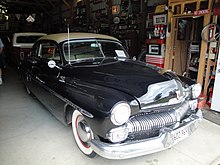
The Monterey (model 72C) was introduced in 1950 as a high-end two-door coupe as part of the Mercury Eight series in the same vein as the Ford Crestliner, the Lincoln Lido coupe and the Lincoln Cosmopolitan Capri coupe in order to compete with the hardtop coupes General Motors and Chrysler had introduced the previous model year. Montereys had either a canvas covered convertible for $2,146 ($27,177 in 2023 dollars [3]) or vinyl for $2,157 ($27,316 in 2023 dollars [3]). Standard features included leather faced seats, simulated leather headliner, wool carpets, chrome-plated interior garnish moldings, two-toned dashboard, special black steering wheel, fender skirts, dual outside rearview mirrors, full wheelcovers & gold winged hood ornament. For $10 more ($127 in 2023 dollars [3]) all leather seats were an option. Two special colors were offered, Turquoise Blue with dark blue top and Cortaro Red metallic with black top. Black with yellow top was also available. Few Montereys were sold.
1952–1954
[edit]| First generation | |
|---|---|
 | |
| Overview | |
| Model years | 1952–1954 |
| Body and chassis | |
| Body style | 4-door sedan 2-door hardtop 2-door convertible 4-door station wagon |
| Related | Lincoln Cosmopolitian Lincoln Capri Mercury Custom Ford Crestline Skyliner |
| Powertrain | |
| Engine | 255 cu in (4.2 L) Flathead V8 256 cu in (4.2 L) Ford Y-block V8 |
| Transmission | 3-speed manual[1] 3-speed Merc-O-Matic automatic[4] |
| Dimensions | |
| Wheelbase | 118.0 in (2,997 mm)[1] |
| Length | 202.2 in (5,136 mm) (1952) |
| Width | 73.5 in (1,867 mm)[5] |
As Ford began to position Mercury as a mid-priced competitor to the Pontiac Chieftain, Buick Special, Studebaker Commander, Hudson Pacemaker, Kaiser Virginian, Nash Statesman, Dodge Meadowbrook and Dodge Coronet, all Mercury vehicles received a styling and engineering redesign for 1952, such as 18% more window area.[1][6] Monterey became a separate series and Mercury's top model line over the mainstream Custom nameplate, a convertible and four-door sedan were included in the new series lineup. The heater and vent controls were changed to levers and placed on a plane set perpendicular to the dash behind the steering wheel, inspired by flight controls in large aircraft.[7] The listed retail price was US$2,370 for the convertible ($27,193 in 2023 dollars [3]).[1] Eleven exterior colors were offered and seventeen two-tone color combinations were provided, and the standard list of equipment included broadcloth upholstery, full carpeting, and electric clock, luggage compartment light and chrome window surroundings. Optional equipment included a heater and windshield defroster, radio with antenna, and fog lamps.[1]
A station wagon was first introduced as a Mercury for 1953 including an optional "woodie" appearance, the same year a Siren Red Monterey Convertible became Ford's forty-millionth car produced.[8] 1954 saw the introduction of the new 161 hp (120 kW) overhead valve Ford Y-block V8, as well as the bubble-top Monterey Sun Valley, named for Sun Valley, Idaho, which had a Plexiglas front half roof which was similar to that of the Ford Crestline Skyliner. The color choices expanded considerably to offer fifteen single choices and thirty nine two-tone selections.[1] The 1954 Montereys also received other alterations, such as new, lower taillights. The Mercury XM-800 concept car, first displayed at the Chicago Auto Show early in 1954, débuted as the Mercury Monterey XM-800.[9][10][11]
-
1952 Mercury Monterey Special Custom Convertible
-
1953 Mercury Monterey 4-door sedan
-
1953 Mercury Monterey station wagon
-
1954 Mercury Monterey Sun Valley
1955–1956
[edit]| Second generation | |
|---|---|
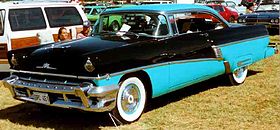 1956 Mercury Monterey Coupe with "Flo-tone" paint combination of Niagara Blue over Tuxedo Black | |
| Overview | |
| Model years | 1955–1956 |
| Body and chassis | |
| Body style | 4-door sedan 4-door hardtop 2-door hardtop 2-door convertible 4-door station wagon |
| Related | Lincoln Capri Mercury Custom Mercury Medalist Mercury Montclair Ford Fairlane |
| Powertrain | |
| Engine | 292 cu in (4.8 L) Ford Y-block V8 312 cu in (5.1 L) Ford Y-block V8 |
| Transmission | 3-speed manual[1] 3-speed Merc-O-Matic automatic Touch-O-Matic overdrive |
| Dimensions | |
| Wheelbase | 119.0 in (3,023 mm) 118.0 in (2,997 mm) (wagons)[1] |
| Length | 206.3 in (5,240 mm)[12] |
| Width | 76.4 in (1,941 mm) |
| Height | 62.4 in (1,585 mm) |
For 1955 the car lost its status as Mercury's top model, replaced by the Montclair. The same year, it gained the 292 cu in (4.8 L) Y-block from the Thunderbird, producing 188 hp (140 kW) with the standard transmission or 198 with the Merc-O-Matic.[13] It used independent ball-joint front suspension.[14] Brake size was increased.[15] The Monterey was positioned above the base model Custom series for the 1955 model year.[16] Optionally available was a dual 4-barrel carburetor setup that provided 260 hp (190 kW) starting in 1956.[1] All Mercury's for 1955 offered a canted hood over the headlights previously introduced on the Mercury XM-800 concept car from 1954. The 1955 four-door sedan was US$2,400 ($27,297 in 2023 dollars [3]) and sold 70,392.[1]
1956 brought another new engine, the 235 hp (175 kW) 312 cu. in[13] and all Mercury sedans underwent an exterior revision, trading its crest badge for a "Big M" emblem.[17] The side trim was revised to a full-length multi-tier chrome spear, with two types of two-tone paint combinations, offering the traditional approach of a roof color over a different body color, and "Flo-tone" where the roof and lower body were painted in one color and the upper body painted in another color. There were a total of thirty-one two-tone combinations and twenty-eight "Flo-tone" combinations.[1]
The update brought several functional revisions, including a 12-volt electric system which allowed the installation of power operated accessories to be installed including air conditioning, standard dual exhaust to improve engine performance, and an automatic self-lubrication system (for the steering and front suspension).[18] Mercury added its own version of the Ford Lifeguard safety system; a deep-dish steering wheel was standard, along with safety door locks, tubeless tires, and a breakaway safety glass rearview mirror.[19] In addition, childproof rear door locks, seatbelts, and a padded dashboards were introduced as free-standing options.[19][20] The 292 V8 was replaced by a 312 cubic-inch V8, producing 225 hp.[21]
-
1955 Mercury Monterey 4-door sedan
-
1956 Mercury Monterey 4-door Sport Sedan
-
1956 Mercury Monterey station wagon
-
1955 Mercury Monterey Coupe in Huntsman Red
1957–1958
[edit]
| Third generation | |
|---|---|
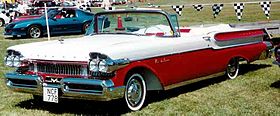 1957 Mercury Monterey Convertible | |
| Overview | |
| Model years | 1957–1958 |
| Body and chassis | |
| Body style | 4-door sedan 4-door hardtop 2-door sedan 2-door hardtop 2-door convertible |
| Related | Mercury Turnpike Cruiser Mercury Montclair Mercury Colony Park Mercury Voyager Mercury Commuter Ford Fairlane 500 |
| Powertrain | |
| Engine | 312 cu in (5.1 L) Ford Y-block V8 368 cu in (6.0 L) Lincoln Y-Block V8 383 cu in (6.3 L) MEL V8 430 cu in (7.0 L) MEL V8 |
| Transmission | 3-speed manual 3-speed Merc-O-Matic automatic |
| Dimensions | |
| Wheelbase | 122.0 in (3,099 mm)[1] |
| Length | 211.1 in (5,362 mm)[1] |
| Width | 79.1 in (2,009 mm)[1] |
| Curb weight | 3,870 lb (1,760 kg)[1] |
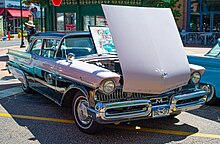

The fullsize Mercury was redesigned for 1957 and grew considerably larger as well, riding on an exclusive 122 in (3,099 mm) wheelbase, elevating Mercury above the new Edsel product line.[1] A new frame design allowed a lower floor which made the car look lower and longer. Interior features included a front seat track stop to keep the front seat back from breaking loose, a new design for the safety steering wheel, a new radio, and memory power front seats.[22][23] The station wagons were divested from the Monterey series, with the Commuter, Voyager, and Colony Park lines and becoming their own series called the "Country Cruiser" in 1959.[1] The 312 Ford Y-block gained 20 horsepower to go with the added weight, and the 290 hp (220 kW) 368 cu in (6.0 L) Lincoln Y-block V8 became an option.[13] Early 1957 Montereys had two headlights however later examples were fitted with four with the turn signals positioned in the headlight alcove above the headlights. Optional turn signal indicators were installed above the headlights to signify to the driver that the lights were functioning.[24]
1958 brought an all-new engine: the 383 cu in (6.3 L) MEL V8. With the new engine came the Multi-Drive three-speed automatic transmission.[25] As tailfins became to gain favor with competitors, Mercury sought to downplay the appearance and offered similar appearances but with much less dramatic bodywork.
For 1957, Mercury offered mechanically activated pushbutton transmission controls in response to the Chrysler TorqueFlite pushbutton controls introduced in 1956. The Mercury control buttons initially offered five buttons and was called "Keyboard Control", with a long button on top labeled "Drive" with four smaller buttons below labeled "Brake", "Neutral Start" which would allow the engine to start with the ignition key, "Hill Control" and "Reverse" with later versions separating the "Drive" button to "Performance" and "Cruising" for 1958 and relabeled as "Multi-Drive". A separate push/pull lever was included below the control buttons labeled "Park" which would lock out the control buttons until the Park button was pulled to release it. The control panel was installed to the left of the steering wheel. In 1959 the keyboard control was discontinued and used a steering column gear selector lever.[1]
1959–1960
[edit]| Fourth generation | |
|---|---|
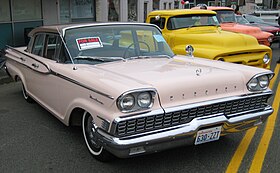 1959 Mercury Monterey 4-door sedan | |
| Overview | |
| Model years | 1959–1960 |
| Body and chassis | |
| Body style | 2-door sedan 4-door sedan 4-door hardtop (Cruiser) 2-door hardtop (Cruiser) 2-door convertible |
| Related | Mercury Park Lane Mercury Montclair |
| Powertrain | |
| Engine | 312 cu in (5.1 L) Ford Y-block V8 383 cu in (6.3 L) MEL V8 |
| Transmission | 3-speed manual 3-speed Merc-O-Matic automatic |
| Dimensions | |
| Wheelbase | 126.0 in (3,200 mm) |
| Length | 1959: 217.8 in (5,532 mm) 1960: 219.2 in (5,568 mm) |
| Width | 81.5 in (2,070 mm) |
| Height | 55.8 in (1,417 mm) |


For 1959, the Mercury Monterey (and Montclair) grew in size, adopting a 126-inch wheelbase.[25] The Mercury-derived Edsel Corsair and Edsel Citation were discontinued; for the first time since 1940, Mercury used its own chassis and body.
The Monterey was offered in five bodystyles, including two and four-door pillared sedans, a two-door convertible, and two-door and four-door Cruiser hardtops.[26][27][28] Taking its name from the discontinued Turnpike Cruiser, the Cruiser was given a large compound-curved rear window (styled as a fastback). To improve interior access and driver visibility, the forward-swept A-pillar was made nearly vertical.[29]
Initially designed for potential production as both an Edsel and a Mercury,[25] the Monterey inherited several design features from the division. The dashboard grouped all instruments and controls centrally around the steering wheel, with thermostat-style climate control (air conditioning was optional), power driver seat (with memory position), and a pre-set speed warning (a precursor to cruise control) offered as options.[29] The "Big M" badging was replaced by lettered Mercury badging across the hood; a scripted "Mercury" badge was added to the interior.
Serving as the base-trim Mercury sedan, the Monterey received a 210 hp 312 cubic-inch V8; the previous 383 cubic-inch V8 (producing 280 hp) was optional.[30][31] A 3-speed manual was standard on the 312; a 3-speed automatic was offered as an option (the only transmission offered on the 383).[31]
For 1960, the Monterey underwent a facelift; along with visually reducing exterior trim (and tailfins),[32] the update shifted its appearance closer in line to the newly introduced Mercury Comet compact sedan and the shared Ford Galaxie platform. The headlights were now integrated into the grille, which was expanded upwards and no longer used the headlight pod appearance which had become dated.[24]
1961–1964
[edit]| Fifth generation | |
|---|---|
 1962 Mercury Monterey Custom 4-Door Hardtop | |
| Overview | |
| Model years | 1961–1964 |
| Body and chassis | |
| Body style | 4-door sedan 4-door hardtop 2-door hardtop 2-door convertible 4-door station wagon |
| Related | Mercury Meteor Mercury Colony Park Mercury Commuter Mercury Marauder Ford Galaxie Ford Country Squire |
| Powertrain | |
| Engine | 223 cu in (3.7 L) Mileage Maker I6 292 cu in (4.8 L) Ford Y-block V8 352 cu in (5.8 L) FE V8 390 cu in (6.4 L) FE V8 406 cu in (6.7 L) FE V8 |
| Transmission | 3-speed manual 4-speed manual 3-speed Merc-O-Matic automatic[33] |
| Dimensions | |
| Wheelbase | 120.0 in (3,050 mm) |
| Length | 214.6 in (5,450 mm) |
| Width | 79.9 in (2,030 mm) |
| Height | 55.0 in (1,400 mm) |


For 1961, Mercury underwent a major transformation of its model line. In a transition from 1957 to 1960, Mercury again shared a bodyshell with a divisional counterpart, shifting from Edsel to Ford, with the Monterey becoming the equivalent of the Ford Galaxie. The Montclair and Park Lane were discontinued, shifting the Monterey from the base-trim Mercury sedan to its flagship, slotted above the newly introduced Mercury Meteor (as with the Comet, intended as an Edsel before the discontinuation of the division).[34] One of the first examples of downsizing, by adopting a common chassis and body with Ford, the Monterey lost six inches of wheelbase, nearly two inches of width, and over 4 inches of length; dependent on powertrain, the 1961 Monterey shed over 300 pounds of curb weight. At 120 inches, the Monterey was given a 1-inch longer wheelbase than the Galaxie.
The Monterey was offered in four bodystyles, including two and four-door hardtops, a four-door sedan, and a two-door convertible.[35][36][37] Sharing its roofline with the Galaxie (except for the Starliner fastback), the Monterey differed primarily by its grille; in place of two large taillamps, Mercury used six small taillamps. While slightly more adorned than its Galaxie counterpart, the Monterey continued to adopt more subdued styling, shifting chrome trim nearly entirely to the front and rear fascias and the roofline.[34]
Shared with the Ford Galaxie, the Monterey again received the 292 cubic-inch Y-block V8 (175 hp), with the option of 352 and 390 cubic-inch FE V8s (220 hp and 300/330 hp, respectively).[34] As before, 3-speed manual and 3-speed automatics were offered, with a 4-speed manual becoming an option.
For 1962, the Monterey served as the entire full-size Mercury line, as Mercury shifted the Meteor nameplate to its all-new intermediate sedan range. The six-cylinder Monterey 6 was introduced, inheriting a 135 hp 223 cubic-inch Mileage Maker inline-6 from the Meteor.[34] To better distinguish the Monterey, stylists added a convex grille (opposed to the flat grille used by Ford); the taillamps were added to the end of the tailfins (further reducing them in size).[38] Intended as the Mercury counterpart of the Ford Galaxie 500XL, the Mercury S-55 was introduced as an option for two-door Monterey hardtops and convertibles, offering front bucket seats, floor-mounted shifters, and special trim. While offered with any Monterey engine, the S-55 option also offered a 405 hp 406 cubic-inch V8.[39]
For 1963, the Monterey underwent a substantial revision to its roofline, reintroducing the retractable rear window used by the 1958-1960 Continental model line and the Mercury Turnpike Cruiser. While again using the reverse-slant design, the power-window mechanism was borrowed from the station wagon line. Named "Breezeway", the retractable rear window was standard on all non-convertible Montereys and S-55s.[40] The front grille adopted a sharply-divided concave design, with the six-lens taillamp rear fascia making a return. As a 19631⁄2 vehicle, Mercury introduced the Mercury Marauder as a trim package for the Monterey; to better compete in racing, Mercury mated the body of the Monterey with the roofline of the Ford Galaxie hardtop.[2][41] While technically a Monterey trim package, the Marauder option could be combined with the S-55 trim.[42] The powertrain line underwent a similar revision, as the 223 six and 292 and 352 V8s were dropped, with a 250 hp 390 becoming the standard engine; a 300 hp 390 was offered, along with 385 hp and 405 hp versions of the 406 V8.[43] As a running change during 1963, the 406 was replaced by a 427 cubic-inch V8, in 410 hp and 425 hp outputs (the latter offered only through special order).[44]
For 1964, Mercury revised its sedan offerings; while the S-55 was discontinued, the Montclair and Park Lane made their return. In another change, the Marauder fastback was introduced as a four-door hardtop (giving Mercury a second roofline distinct from Ford); while performance-oriented, all three Mercury sedans offered the Marauder roofline as an option. In line with the Ford Thunderbird, the entire front fascia became more convex, with a more closely-fitting front bumper. Coinciding with the Montclair and Park Lane, the Monterey was reintroduced as a two-door sedan; the four-door hardtop was only offered as a Marauder fastback.[45]
-
1961 Mercury Monterey 2-Door Hardtop
-
1962 Mercury Monterey convertible
-
1962 Mercury Monterey convertible rear
-
1963 Monterey
-
Rear "Breezeway" window
-
1964 Mercury Monterey two-door Marauder Hardtop
1965–1968
[edit]| Sixth generation | |
|---|---|
 1968 Mercury Monterey 4-door sedan | |
| Overview | |
| Model years | 1965–1968 |
| Body and chassis | |
| Body style | 4-door sedan 4-door hardtop 2-door hardtop 2-door convertible 4-door station wagon |
| Related | Mercury Park Lane Mercury Montclair Mercury Marauder Mercury Commuter Ford Galaxie |
| Powertrain | |
| Engine | 390 cu in (6.4 L) FE V8 410 cu in (6.7 L) FE V8 427 cu in (7.0 L) FE V8 428 cu in (7.0 L) FE V8 |
| Transmission | 3-speed manual 4-speed manual 3-speed Merc-O-Matic automatic 3-speed C6 automatic |
| Dimensions | |
| Wheelbase | 123.0 in (3,120 mm) |
For the 1965 year, Mercury redesigned its full-size line, with the Monterey again serving its base-trim sedan. Growing in size to a 123-inch wheelbase (4 inches longer than Ford), the Monterey adopted an all-new chassis and redesigned rear suspension, abandoning leaf springs for a coil-sprung live rear-axle.[46]
While again derived directly from the Ford Galaxie, the exterior of Mercury sedans adopted multiple design elements from the popular Lincoln Continental, branding the entire Mercury model line designed "in the Lincoln Continental tradition".[47] In place of the vertically stacked headlights of Ford, the Monterey adopted four horizontal headlamps; the grille was styled similar to the Continental, adopting straight-lined front fenders. The rear fascia was also styled similar to the Continental (adding two taillamp lenses to the bumper); all vestiges of the tailfins were removed. The Monterey was now offered in six body styles, offering two-door and four-door sedans, a four-door sedan with a "Breezeway" rear window, two-door and four-door hardtops, and a two-door convertible.[48][49] The Breezeway roof was now limited to 4-door sedans; as an alternative, hardtops were fitted with passive "flow-through" ventilation.[47] In 1965 the Mercury Commuter station wagon returned to the Monterey line as a lower priced alternative to the Colony Park station wagon that was now part of the Park Lane model line.[24]
The powertrain was carried over from 1964; a 250 hp 390 V8 was standard, with optional 300 hp "Super" and 330 hp "Interceptor" versions.[46] A 425 hp 427 V8 was also offered as an option.[46]
For 1966, the Monterey underwent some minor styling revisions. The taillights were redesigned (removing the lower lenses from the bumper), adding chrome trim bands; the side front fender vents were redesigned. Two-door hardtops received a new roofline with thinner C-pillars.[2] The engine lineup underwent multiple changes, as the 390 was increased to 265 hp (275 with automatic); the Super and Interceptor versions were dropped, replaced by a 330 hp 410 cubic-inch V8 (exclusive to Mercury).[50] The 427 V8 (largely a racing engine) was dropped, with Mercury introducing a 345 hp 428 cubic-inch V8 as its most powerful engine option.[50]
For 1967, the roofline of four-door sedans underwent a minor revision, adopting a more formal C-pillar profile; the reverse-slant Breezeway roof was discontinued (an optional retractable rear window remained available, using the standard roofline[51]). For a third time, the taillamps were redesigned, spanning from the top of the fender to the bottom of the bumper. Largely overshadowed by the smaller Cougar, the S-55 became an option package for full-size Mercury two-doors.[52]
For 1968, the front fascia underwent a minor restyle, again modeled after the Lincoln Continental; along with larger parking lamp lenses, the front fender vents were deleted. The 410 V8 was dropped, with a 280 hp version of the 390 introduced; the 428 was detuned to 340 hp.[53]
-
1965 Mercury Monterey Convertible
-
1966 Mercury Monterey 2-Door Hardtop
-
1966 Mercury Monterey Convertible
-
1967 Mercury Monterey Convertible
-
1968 Mercury Monterey Convertible
1969–1974
[edit]| Seventh generation | |
|---|---|
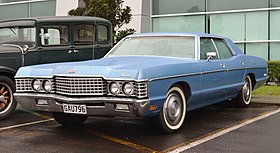 1972 Mercury Monterey | |
| Overview | |
| Model years | 1969–1974 |
| Body and chassis | |
| Body style | 4-door sedan 4-door hardtop 2-door hardtop 2-door convertible 4-door station wagon |
| Related | Mercury Marquis Mercury Colony Park Ford LTD Ford Galaxie Ford Country Sedan |
| Powertrain | |
| Engine | 390 cu in (6.4 L) FE V8 400 cu in (6.6 L) Cleveland V8 429 cu in (7.0 L) 385-series V8 460 cu in (7.5 L) 385-series V8 |
| Transmission | 3-speed manual 4-speed manual 3-speed C6 automatic |
| Dimensions | |
| Wheelbase | 124.0 in (3,150 mm) |
For 1969, the Mercury model line underwent a significant revision, with the Montclair repackaged as the Monterey Custom trim level. An all-new chassis made its debut; sedans were based on a 124-inch wheelbase, Monterey station wagons used a 121-inch wheelbase (alongside Ford station wagons and sedans).[54][55] Following the expansion of the Marquis to a full model range, the Monterey was the base-trim model range, offered as a two-door hardtop, two-door convertible, four-door sedan, four-door hardtop.[56] In another revision, Mercury station wagons were no longer a separate model range, with the Mercury Commuter renamed the Monterey station wagon. While the trim package was similar to the mid-level Ford Country Sedan the Monterey station wagon didn't have a similar trim package nameplate, the simulated woodgrain body panels or concealed headlights like the more upscale Colony Park and continued the appearance until the Monterey nameplate was retired in 1975.[57]
More rounded in styling than the previous generation, the Monterey and Monterey Custom were distinguished from the Marquis by their lack of hidden headlights, differing from Fords in grille and taillamp styling. For 1970, the grille underwent a further revision and wider taillamps were introduced to better differentiate the Monterey from its Ford counterparts.
In 1971, the Mercury full-size model range underwent an exterior restyling. While retaining the roofline shared with Ford, the Monterey adopted design elements similar to the larger Lincoln Continental, included its wide-pointing grille and taillamps. In a major change, Ford and Mercury introduced "pillarless hardtops", using frameless door glass on both hardtops and four-door sedans; vent windows were discontinued. Redesigned door handles no longer protruded from the exterior; rear fender skirts were standardized on all full-size Mercury sedans except the base-trim Monterey. The Monterey and Marquis convertibles were discontinued for 1971, leaving the Cougar as the sole Mercury convertible.
For 1972, the Monterey underwent minor exterior revisions, replacing the full-width horizontal grille for an egg-crate style design. In line with federal regulations, front seatbelt warning buzzers were introduced. For the first time, an automatic transmission was standard, along with power steering and power brakes.[55]
For 1973, the full-size Mercury line underwent an exterior redesign, adapting to the introduction of federally mandated 5 mph bumpers.[55] Along with slightly more angular styling, the Monterey adapted much of the front fascia of the Ford Galaxie, distinguished largely by a centered eggcrate grille, with fender skirts becoming an option.[58] For 1974, the Monterey saw a revision to its grille and headlight trim.
For 1975, Mercury discontinued the Monterey, consolidating its full-size range down to the Marquis.[55] The same year, the Grand Marquis was introduced as a sub-model, becoming a distinct model range in 1983.
Approximately 7,850,000 full-size Fords and Mercurys were sold over 1969–78; this makes it the second best selling Ford automobile platform after the Ford Model T.[55][57][59]
-
1969 Mercury Monterey convertible
-
1969 Mercury Monterey convertible, rear
-
1971 Mercury Monterey four-door hardtop
-
1971 Mercury Monterey four-door hardtop, rear
-
1972 Mercury Monterey Custom 4-door hardtop
-
1972 Mercury Monterey Custom, rear
-
1973 Mercury Monterey
-
1974 Mercury Monterey
-
1974 Mercury Monterey, rear
-
1974 Mercury Monterey interior (front seat)
-
1974 Mercury Monterey interior (rear seat)
Powertrain
[edit]The 351 Windsor and 400 cu in (6.6 L) Cleveland V8s were added for 1971, the final year for the 390. The 429 V8, which was standard on the Marquis beginning in 1969, was available as an extra cost option on all Monterey models each year including a two-barrel 320-horsepower version and a four-barrel 360-horsepower option from 1969 to 1971. Both of those 429s were replaced by single 209 net horsepower 429 four-barrel for 1972, which was designed to run on regular, low lead or unleaded gasoline as was the case with all Ford Motor Company engines starting with the 1972 model year.[55] Engine offerings for 1973–74 included the 351 Windsor two-barrel standard on base Montereys and the Cleveland-based 400 two-barrel standard on Monterey Custom and optional on base models. The 429 V8 was discontinued after 1973 and Lincoln's 460 V8 became the top option on all models for 1974.
The Monterey in Canada
[edit]After 1963, the Monterey was not sold in Canada, but was supplanted by the resurrected Meteor. Meteor competed in the low-priced field, but its upper trim series (Montcalm and LeMoyne) were typically very similar to the U.S. Monterey both in styling and appointments. Meteor continued as a separate marque through 1976 (1975–76 models continued the 1974 Monterey's front end styling[55]) after which the name was applied to a base trim version of the Marquis, as the "Mercury Marquis Meteor" through 1981.
See also
[edit]References
[edit]- ^ a b c d e f g h i j k l m n o p q r s Flory, Jr., J. "Kelly" (2008). American Cars, 1946–1959 Every Model Every Year. McFarland & Company, Inc., Publishers. ISBN 978-0-7864-3229-5.
- ^ a b c "Full-Size Mercury Cars of the 1960s". How Mercury Cars Work. HowStuffWorks.com. 6 June 2007. Retrieved 2008-12-03.
- ^ a b c d e 1634–1699: McCusker, J. J. (1997). How Much Is That in Real Money? A Historical Price Index for Use as a Deflator of Money Values in the Economy of the United States: Addenda et Corrigenda (PDF). American Antiquarian Society. 1700–1799: McCusker, J. J. (1992). How Much Is That in Real Money? A Historical Price Index for Use as a Deflator of Money Values in the Economy of the United States (PDF). American Antiquarian Society. 1800–present: Federal Reserve Bank of Minneapolis. "Consumer Price Index (estimate) 1800–". Retrieved February 29, 2024.
- ^ "Directory Index: Mercury/1952 Mercury/1952 Mercury Prestige Brochure". Oldcarbrochures.com. Retrieved 2011-11-20.
- ^ "1953 Mercury Foldout". The Old Car Manual Project Brochure Collection.
- ^ "Directory Index: Mercury/1952 Mercury/1952 Mercury Prestige Brochure". Oldcarbrochures.com. Retrieved 2013-03-01.
- ^ "Directory Index: Mercury/1952 Mercury/1952 Mercury Prestige Brochure". Oldcarbrochures.com. Retrieved 2011-11-20.
- ^ Flory, J. "Kelly", Jr. American Cars 1946–1959 (Jefferson, NC: McFarland & Coy, 2008), p.515.
- ^ “Mercury’s New Monterey.” Chicago Tribune, 21 February 1954.
- ^ “Mercury Sends Experimental MX-800 to Show.” Chicago Tribune, 14 March 1954.
- ^ “1st Showing in Chicago…The New Mercury Monterey XM-800.” (Chicago Auto Show Display Ad) Chicago Tribune, 14 March 1954.
- ^ "Directory Index: Mercury/1955 Mercury/album". Oldcarbrochures.com. Retrieved 2011-11-20.
- ^ a b c Consumer Guide (6 June 2007). "1955, 1956, 1957 Mercury Cars". How Mercury Cars Work. HowStuffWorks.com. Retrieved 2008-12-09.
- ^ "Directory Index: Mercury/1955 Mercury/album". Oldcarbrochures.com. Retrieved 2012-08-17.
- ^ "Directory Index: Mercury/1955 Mercury/album". Oldcarbrochures.com. Retrieved 2012-08-17.
- ^ John Gunnell, Standard Catalog of American Cars 1946–1975, Revised 4th Edition, page 515
- ^ "Directory Index: Mercury/1956 Mercury/album". www.oldcarbrochures.com. Retrieved 2021-06-04.
- ^ "Directory Index: Mercury/1956 Mercury/album". www.oldcarbrochures.com. Retrieved 2021-06-04.
- ^ a b "1956 Mercury Prestige Brochure". www.oldcarbrochures.com. Retrieved 2021-06-04.
- ^ "Directory Index: Mercury/1956 Mercury/album_002". Oldcarbrochures.com. Retrieved 2012-05-20.
- ^ "Directory Index: Mercury/1956 Mercury/album". www.oldcarbrochures.com. Retrieved 2021-06-04.
- ^ "1957 Mercury Quick Facts-13". oldcarbrochures.org. Archived from the original on 2017-02-26.
- ^ "1957 Mercury Quick Facts-14". oldcarbrochures.org. Archived from the original on 2017-02-26.
- ^ a b c Gunnell, John, ed. (1987). The Standard Catalog of American Cars 1946–1975. Kraus Publications. ISBN 0-87341-096-3.
- ^ a b c Consumer Guide (6 June 2007). "1958, 1959 Mercurys". How Mercury Cars Work. HowStuffWorks.com. Retrieved 2008-12-09.
- ^ "1959 Mercury Brochure". www.oldcarbrochures.com. Retrieved 2020-11-28.
- ^ "1959 Mercury Brochure". www.oldcarbrochures.com. Retrieved 2020-11-28.
- ^ "1959 Mercury Brochure". www.oldcarbrochures.com. Retrieved 2020-11-28.
- ^ a b "1959 Mercury Brochure". www.oldcarbrochures.com. Retrieved 2020-11-28.
- ^ "Detailed specs review of 1960 Mercury Monterey Convertible 383 V-8 Merc-O-Matic offered since October 1959 for North America U.S." www.automobile-catalog.com. Retrieved 2020-11-28.
- ^ a b "Directory Index: Mercury/1960 Mercury/1960_Mercury_Facts_Booklet". www.oldcarbrochures.com. Retrieved 2020-11-28.
- ^ "Directory Index: Mercury/1960 Mercury/1960_Mercury_Facts_Booklet". www.oldcarbrochures.com. Retrieved 2020-11-28.
- ^ "Directory Index: Mercury/1964 Mercury/1964 Mercury Full Size Brochure". Oldcarbrochures.com. Retrieved 2011-11-20.
- ^ a b c d Consumer Guide (6 June 2007). "The 1960s: More Mercury Models, Fewer Buyers". How Mercury Cars Work. HowStuffWorks.com. Retrieved 2008-12-09.
- ^ "Directory Index: Mercury/1961 Mercury/1961_Mercury_Full_Size_Brochure". www.oldcarbrochures.com. Retrieved 2020-11-28.
- ^ "Directory Index: Mercury/1961 Mercury/1961_Mercury_Full_Size_Brochure". www.oldcarbrochures.com. Retrieved 2020-11-28.
- ^ "Directory Index: Mercury/1961 Mercury/1961_Mercury_Full_Size_Brochure". www.oldcarbrochures.com. Retrieved 2020-11-28.
- ^ "1962 Mercury Full Line Brochure". www.oldcarbrochures.com. Retrieved 2020-11-28.
- ^ "Directory Index: Mercury/1962_Mercury/1962 Mercury_Monterey_S55_Folder". www.oldcarbrochures.com. Retrieved 2020-11-28.
- ^ "1963 Mercury Full Line Brochure". www.oldcarbrochures.com. Retrieved 2020-11-28.
- ^ "How Mercury Cars Work". HowStuffWorks. 2007-06-06. Retrieved 2020-11-28.
- ^ "Directory Index: Mercury/1963 Mercury/1963_Mercury_Marauder_Foldout". www.oldcarbrochures.com. Retrieved 2020-11-28.
- ^ "1963 Mercury Full Line Brochure". www.oldcarbrochures.com. Retrieved 2020-11-28.
- ^ "Directory Index: Mercury/1963 Mercury/1963_Mercury_Marauder_Foldout". www.oldcarbrochures.com. Retrieved 2020-11-28.
- ^ "Directory Index: Mercury/1964 Mercury/1964_Mercury_Full_Size_Brochure". www.oldcarbrochures.com. Retrieved 2020-11-28.
- ^ a b c "Directory Index: Mercury/1965 Mercury/1965_Mercury_Full_Size_Brochure". www.oldcarbrochures.com. Retrieved 2020-11-29.
- ^ a b "Directory Index: Mercury/1965 Mercury/1965_Mercury_Full_Size_Brochure". www.oldcarbrochures.com. Retrieved 2020-11-29.
- ^ "Directory Index: Mercury/1965 Mercury/1965_Mercury_Full_Size_Brochure". www.oldcarbrochures.com. Retrieved 2020-11-29.
- ^ "Directory Index: Mercury/1965 Mercury/1965_Mercury_Full_Size_Brochure". www.oldcarbrochures.com. Retrieved 2020-11-29.
- ^ a b "Directory Index: Mercury/1966_Mercury/1966_Mercury_Full_Size_Brochure". www.oldcarbrochures.com. Retrieved 2020-11-29.
- ^ "Directory Index: Mercury/1967 Mercury/album_001". www.oldcarbrochures.com. Retrieved 2020-11-29.
- ^ "Directory Index: Mercury/1967 Mercury/album_001". www.oldcarbrochures.com. Retrieved 2020-11-29.
- ^ "1968 Mercury Full Line Brochure". www.oldcarbrochures.com. Retrieved 2020-11-29.
- ^ "Directory Index: Mercury/1969 Mercury/1969_Mercury_Full_Line_Brochure". www.oldcarbrochures.com. Retrieved 2019-04-29.
- ^ a b c d e f g Odin, L.C. A concise guide to the Ford and Mercury full-size automobile production 1969-1978. Belvedere Publishing, 2016. ASIN: B01HE91Y4K.
- ^ "Directory Index: Mercury/1969 Mercury/1969_Mercury_Full_Size_Brochure". www.oldcarbrochures.com. Retrieved 2019-04-29.
- ^ a b Kowalke, Ron (1997). Standard Catalog of American Cars 1946–1975. Krause publications. ISBN 0-87341-521-3.
- ^ "Directory Index: Mercury/1973 Mercury/1973 Mercury Full Line Brochure". www.oldcarbrochures.com. Retrieved 2019-04-29.
- ^ Flammang, James Standard Catalog of American Cars 1976–1999 3rd Edition (Iola, WI: Krause Publications, Inc 1999)





